




3 Julio Escobar’s Message 4 Catholics, Community Members Walk And Rally Against Violence In San Francisco 6 Remembering Father Piers M. Lahey, “A True Disciple Of Christ” 8 A Snapshot Of One Visit To San Quentin State Prison 10 San Quentin State Prison In-Custody Reentry Fair 11 Restorative Justice Rosary Rally Prayer Group 12 Students, Volunteers Join Efforts To Spread Easter Joy In The Jails 14 Scholarships, Mentoring Offer Way Back For Formerly Incarcerated 17 Students Of Today, Leaders Of Tomorrow 18 Restorative Justice Breakfast Debuts At St. Mark’s Church 20 Miguel Infante, Excell Network Student 22 Joseph Krauter, Excell Network Student 26 Reentry Conference & Resource Fair 2023 27 St. Agnes Church Celebrates The First Year Of Excell Network’s Breakfasts 28 Excell Network Breakfast Student Statements & Why It Matters To Them 30 Daisy Gonzalez, Excell Network Student 32 Elizabeth Quiroz, Excell Network Student 34 Restorative Parenting Workshop “Building Healthy Relationships” 37 Christi Grove, Excell Network Student 39 Students’ Retreat 41 Adrian Lewis, Excell Network Student Contents YEAR IN REVIEW 2022 Statement By Archbishop Salvatore J. Cordileone On Praying For The Abolition Of The Death Penalty PAGE 7 Reentry Conference & Resource Fair 2022: “Restoring Hope” PAGE 24 A Christmas Party To Remember For Parents And Children Alike PAGE 47 2 | Restorative Justice and Practices - Year In Review 2022
• Miguel Infante
• Joseph Krauter
• Daisy Gonzalez
• Elizabeth Quiroz
• Christi Grove
• Adrian Lewis
• Carolina Parrales
• Maureen Lundy
• Eduardo Banos
• Dana Perrigan
• Melissa Vlach

• Michael Vezzali-Pascual
• Jan Potts
• Valerie Schmalz
• Julio Escobar
JULIO ESCOBAR’S MESSAGE
Dear Restorative Justice Community:
Words could not express the joy and gratitude I feel in my heart as we look back to the year that just passed. As 2023 starts, so does my 14th year of serving in this great Archdiocese and 28 years in my mission. It has been another wonderful year as God has been with us and graciously blessed our efforts with amazing volunteers and the generosity of our inspired and enthusiastic donors, and prayers of many. Thank you for walking the journey of restorative justice and practices with us.
So much has happened over the course of 2022 and we can not share everything here; but we witnessed remarkable stories of life change. We hope you will join us to continue nurturing and being a ministry of presence, as our ministry motto reads. God bless you all!

43 Volunteers Serve Thanksgiving Meals And Hope In The San Francisco Jails 46 Share A Thanksgiving Meal With An Incarcerated Person 50 Restorative Justice Ministry Christmas Angels Event 51 Support Our Local Families Through Christmas Angels Event CONTRIBUTORS IN THIS ISSUE
Practices A MINISTRY OF PRESENCE
Published by the Archdiocese of San Francisco Restorative Justice Ministry, One Peter Yorke Way, San Francisco, CA 94109 For questions and comments, please contact Julio Escobar Email: escobarj@sfarch.org Tel.: (415)614-5572 Restorative Justice and Practices - Year In Review 2022 | 3
Restorative Justice and
Restorative Justice Ministry
Catholics, community members walk and rally against violence in San Francisco
Proclaiming “What do we want? Peace and justice!”, an intensely committed group of Catholics and community members walked two miles from mid-town to St. Agnes Church in the Haight-Ashbury, carrying white crosses to honor those who died by violence last year.

The Feb. 5 Walk for Peace, organized by the Archdiocese of San Francisco Restorative Justice Ministry, brought together Bay Area volunteers, parishioners, and community members to publicly proclaim a need for ending the violence that claimed 56 lives by homicide in San Francisco, 16 in San Mateo County and two in Marin County.
Participants carried white crosses representing the lives lost to violence in 2021.
The walk began at the Cathedral of St. Mary of the Assumption and concluded at St. Agnes Parish in San Francisco, where a Mass was celebrated as a memorial for all those who died, some still unknown.
Julio Escobar, Restorative Justice coordinator, explained that the day was an important way of remembering those who don’t have others to remember them. “Some people died and didn’t even have a family,” he said in the event’s opening remarks.
Marianella Sobalvarro, a parishioner at St. Bruno Church in San Bruno, echoed this in explaining her reasons for attending. “Even though I didn’t know anybody, I wanted to come and support all of those souls because they might not have anyone to pray for them,” she said.
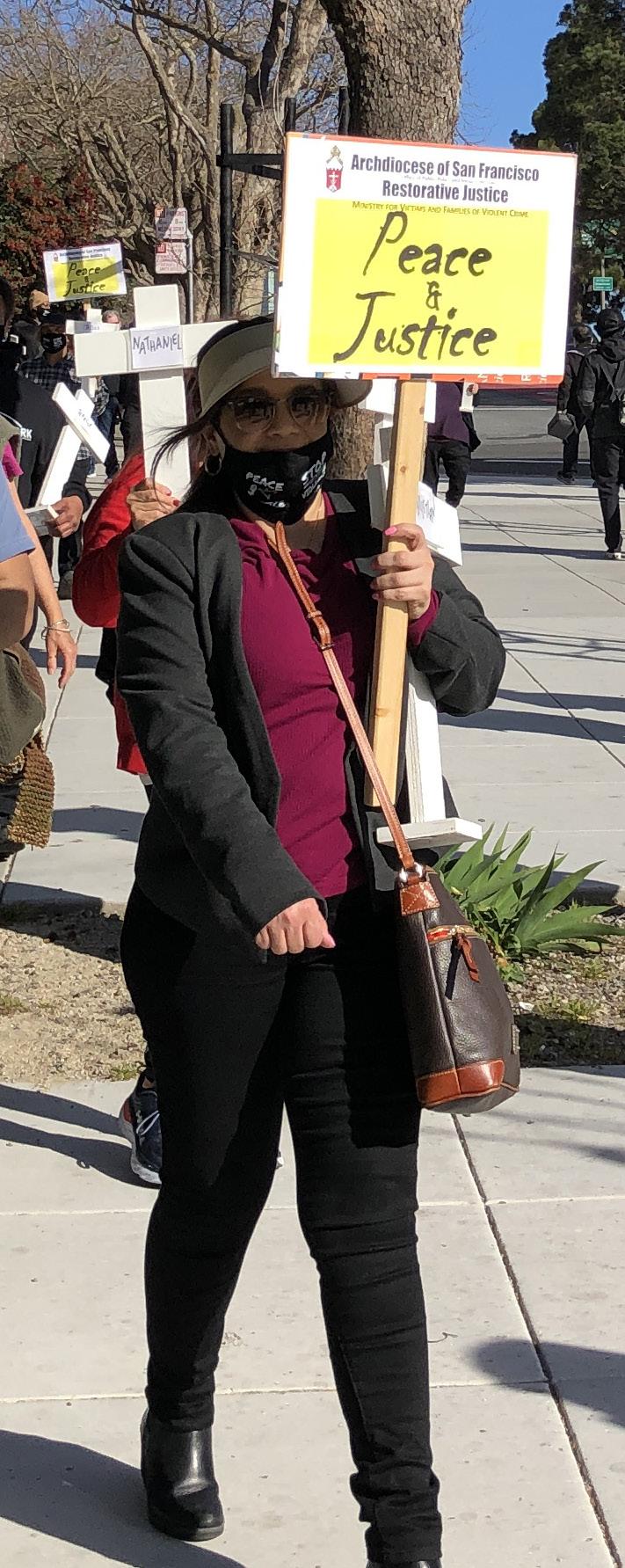
Throughout the walk, the group chanted, “What do we want? Peace and justice! When do we want it? Now!”
Kathy Fourre of the Church of the Epiphany in San Francisco commented that making a public statement brings the issue to the attention of those who haven’t been personally affected by violence. “If you haven’t lost somebody or if it’s not happening right in front of you, it’s easy to forget,” she said.
4 | Restorative Justice and Practices - Year In Review 2022
Story and Photos by MELISSA VLACH, February 8, 2022 Social Action and Digital Media Coordinator Office of Human Life & Dignity Archdiocese of San Francisco Story first published on sfarch.org/Catholic-SF
For many, however, the issue is all too personal. A number of attendees have lost loved ones to violence, and several shared their thoughts after the group arrived at St. Agnes.
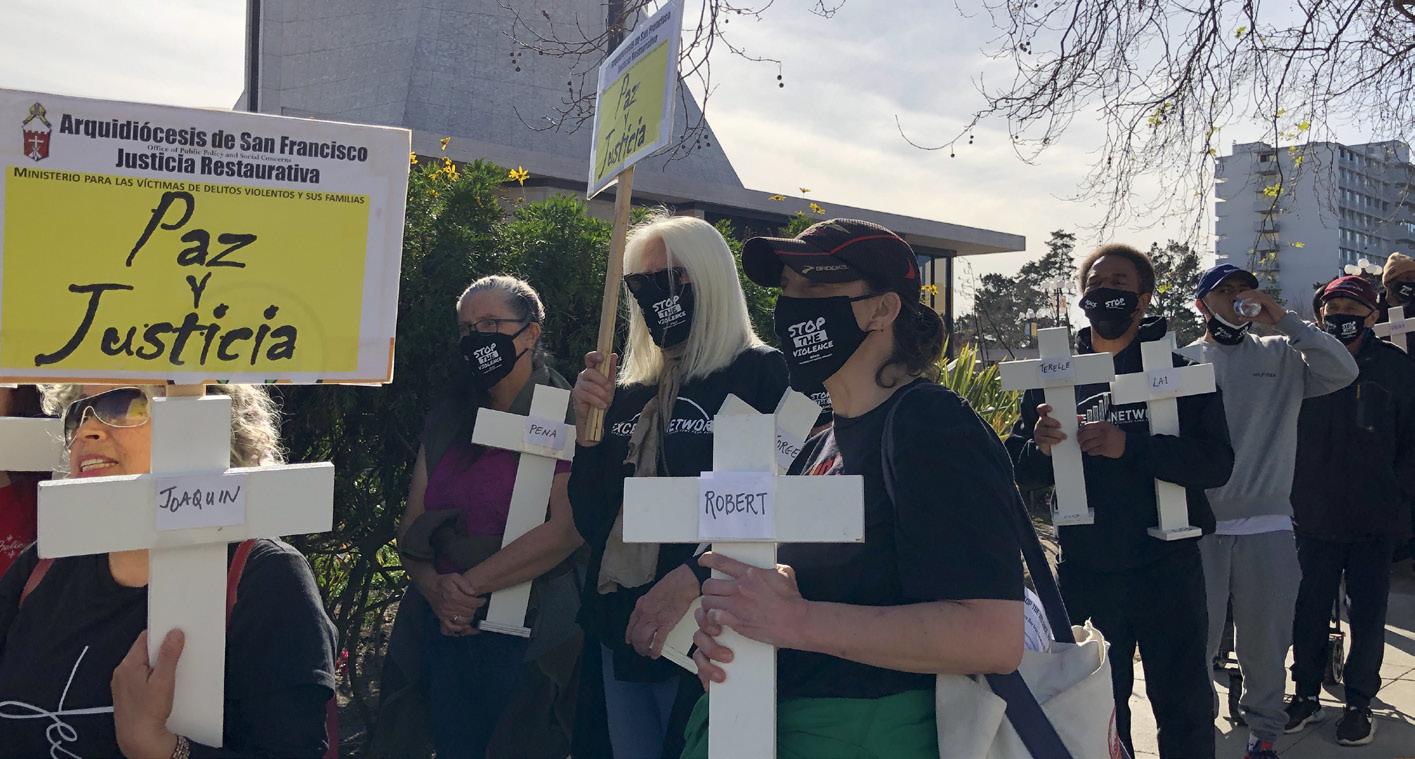
Tinisch Hollins, executive director of Californians for Safety and Justice, spoke about losing several family members to violence and how that spurs her on in her work.

“Long before I became the executive director of this organization, doing policy work to remove barriers for victims and survivors, it was clear that the only way for us to keep our communities safe was to help people when they’d been hurt and to help the people who are hurting,” Hollins said. “That’s how we get to safety.”
Father Jayson Landeza, pastor of St. Benedict Church in Oakland, came with some of his parishioners. He said that they are active in standing for peace in their local neighborhood, which sees high levels of violence. “So we commit ourselves in what we do and the work we do today to make sure
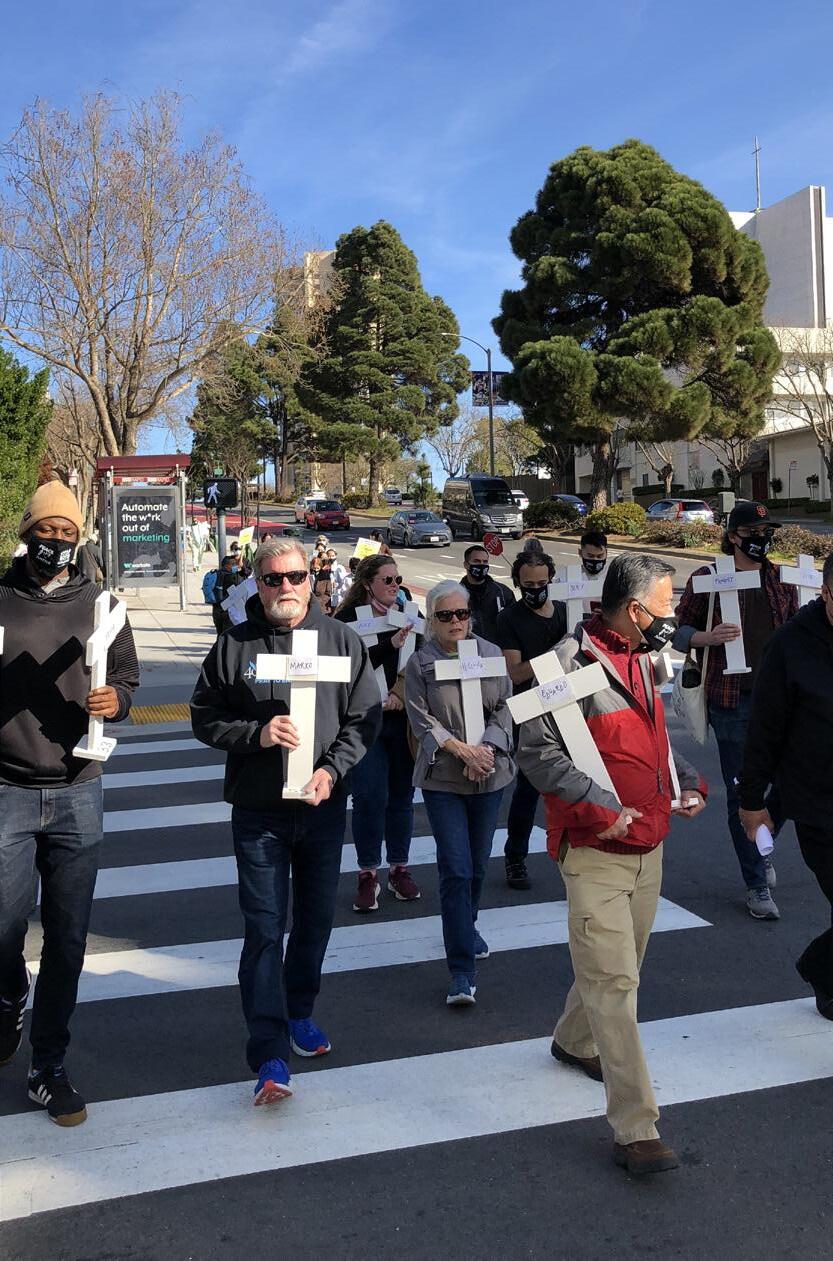
that we remember and that we do… our own part to make sure that violence, that scourge, decreases in our own midst,” Father Landeza said.
Jesuit Father George Williams celebrated the Mass and spoke of mourning the lives lost to violence and grieving for the perpetrators who destroy part of themselves by committing acts of violence, while remembering the interconnectedness of all humans through God.
“Our language, our culture, the very symbols of our religions all come from our interconnection with one another, and when a homicide occurs, that connection is torn, it’s broken,” said Father Williams, pastor of St. Agnes who previously was chaplain for many years at San Quentin State Prison.
The Restorative Justice Ministry also holds street prayer services for individual lives lost to violence throughout the year.
“Some people died and they didn’t even have a family.”
Restorative Justice and Practices - Year In Review 2022 | 5
Julio Escobar, Coordinator of Restorative Justice Ministry
FatherRemembering Piers M. Lahey, “A true disciple of Christ”
Father Piers M. Lahey died at the St. Andrew Parish rectory on Nov. 28, 2022, at age 73.
The Bay Area native served his entire priestly life of nearly 40 years as a parish priest for the Archdiocese of San Francisco. He concurrently served as chaplain to the Archdiocese’s Restorative Justice Ministry.

Julio Escobar, coordinator of the ministry, called Father Lahey “a true disciple of Christ” who felt a special commitment to those who live on the margins and to all who suffer.
“He wanted to make sure that every person had the dignity of a prayer service at the end of their life,” said Escobar. Even as his health failed, he showed up to anoint crime scenes and comfort grieving families.

Born on May 2, 1949, Piers Lahey graduated from St. Patrick University & Seminary in Menlo Park and was ordained on Decemeber 4, 1982.
Father Lahey’s first parish assignment was Star of the Sea Parish in San Francisco. He served St. Anthony of Padua Parish in Novato, two consecutive terms as pastor of Church of the Good Shepherd in Pacifica, and a year at St. Charles Parish in San Carlos. At the time of his death, he was in his second term as pastor of St. Andrew Parish in Daly City.
Catholic Cemeteries director Monica Williams said Father Lahey was well known by the staff of local funeral directors and cemeteries for his desire to help families with graveside services who did not have a local parish or who might not be currently practicing their faith.
“He kept folders for each person, researching details and stories so he could give a personal and loving homily at the graveside of even people he didn’t know,” said Williams, regarding the services he conducted at Holy Cross Cemetery in Colma.
He always ended the service, she said, with the reminder that, “We are an Easter people….That is why we affirm that this life is not ended; this life is changed by the God who makes everything, all things, new again.”
Photo by Valerie Schmalz
6 | Restorative Justice and Practices - Year In Review 2022
Photo by Julio Escobar
Statement by Archbishop
Salvatore J. Cordileone on Praying for the Abolition of the Death Penalty
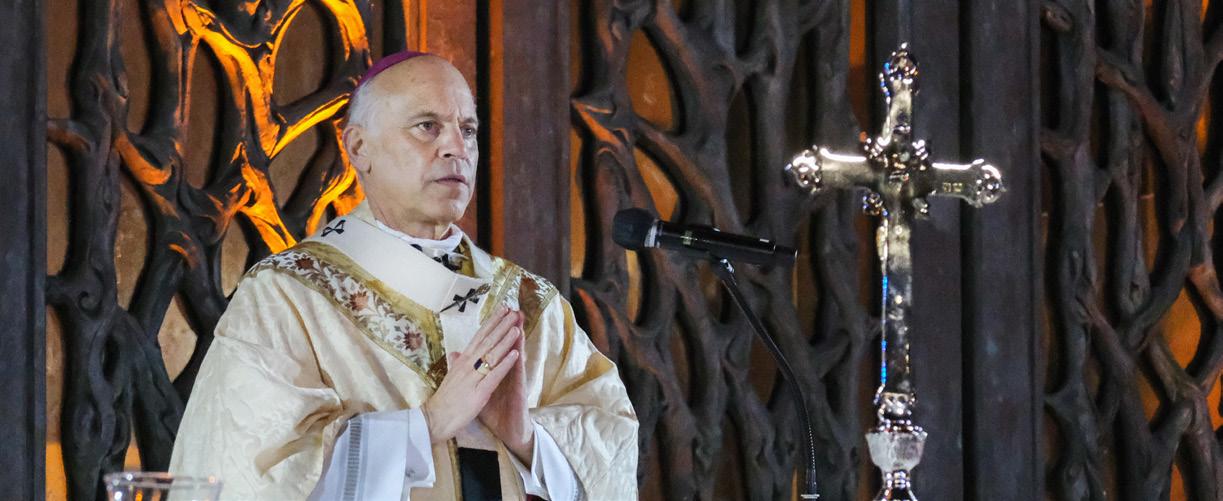
Pope Francis is inviting us throughout the month of September to pray especially for the abolition of the death penalty. I wish to personally encourage the faithful to add this intention to their prayers.
As I wrote in 2016 when I joined fellow California bishops in unanimously supporting voter initiatives to abolish the death penalty, the answer to a violent crime “is certainly not by inflicting more violence.”
It is well past time that the death penalty be stricken from the books.
As Pope Francis wrote in his encyclical Fratelli Tutti: On Fraternity and Social Friendship: “Today we state clearly that ‘the death penalty is inadmissible’ [247] and the Church is firmly committed to calling for its abolition worldwide.”
(Fratelli Tutti, 263)
In 2019, Gov. Gavin Newsom imposed a moratorium on the death penalty and in January of this year ordered the dismantling of Death Row. Yet, the death penalty remains a penalty in the federal judicial system and in our state. In California, voters have twice rejected efforts to repeal the death penalty.

Therefore, our prayers must turn to changing minds and hearts so that all of our fellow citizens will come to believe in the importance of preserving and nurturing all human life.
“The new evangelization calls for followers of Christ who are unconditionally pro-life: who will proclaim, celebrate and serve the Gospel of life in every situation,” Pope St. John Paul said (speaking during a 1999 visit to St. Louis), noting “…the dignity of human life must never be taken away, even in the case of someone who has done great evil. Modern society has the means of protecting itself, without definitively denying criminals the chance to reform.” (cf. Evangelium Vitae, 27).
As we, the Catholic bishops of California, said in our statement reaffirming opposition to the death penalty in 2016: “Our support to end the use of the death penalty is also rooted in our unshakable resolve to accompany and support all victims of crime…. As we pray with them and mourn with them, we must also stress that the current use of the death penalty does not promote healing. It only brings more violence to a world that has too much violence already.”
Our Archdiocese of San Francisco Restorative Justice Ministries support crime victims and their families, men and women in prison and jail, and the formerly incarcerated. Thank you to those who carry out these ministries. Please pray for them and those they assist, for the abolition of the death penalty, and respect for all human life.
To learn more about the work of the Archdiocesan Restorative Justice Ministry, visit: https://www.sfarch.org/ rjministry
Story first published on sfarch.org
September 1, 2022
Restorative Justice and Practices - Year In Review 2022 | 7
Photo by Dennis Callahan
On a sunny day in April, staff and volunteers with the Archdiocese of San Francisco Restorative Justice Ministry arrived at San Quentin State Prison to take part in a victimoffender dialogue that aims to build empathy among men who have committed violent crimes including homicide.
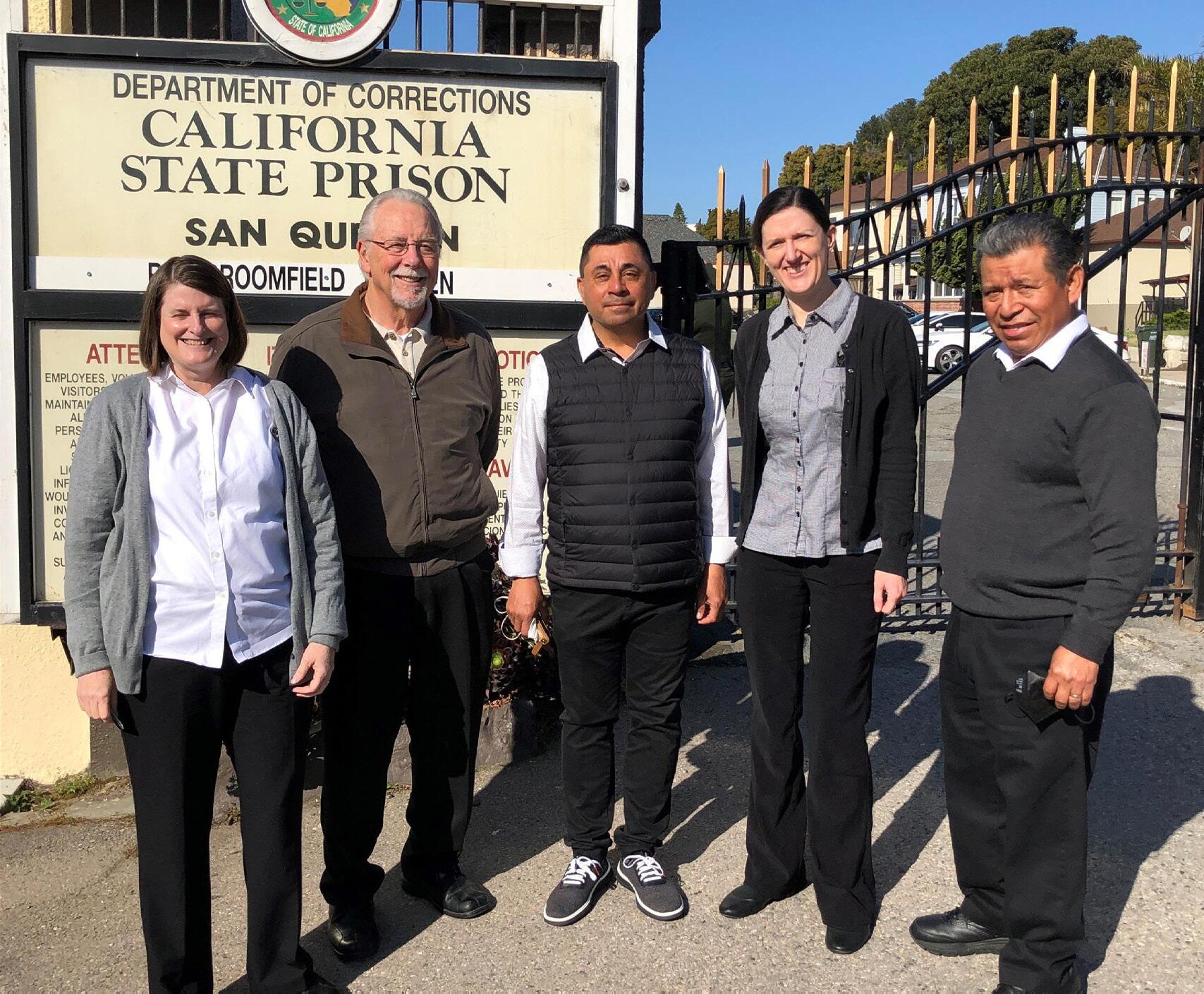
The reentry program, led by the nonprofit California Reentry Institute, enlisted volunteers from the Archdiocese of San Francisco’s Restorative Justice Ministry to share their stories with the prisoners at the state’s maximum-security prison located in Marin County.
After going through security and being guided across the prison grounds, past the men playing soccer and lifting weights, the group arrived in the portable trailer that would serve as a classroom, taking their places in front of about 30 men.
Victim-offender dialogues help build empathy in offenders: A snapshot of one visit to San Quentin State Prison
 Story by MELISSA VLACH, April 2022
Story by MELISSA VLACH, April 2022
 Action and Digital Media Coordinator Office of
Action and Digital Media Coordinator Office of




 &
&





Volunteers Ramon and Patricia Marquez and Michael Patrick had agreed to share their stories for one of the sessions of this prerelease program, which is designed to help inmates build empathy and understanding of their past actions through in-depth workshops over the course of several years.
“For the prisoners, it gives them an opportunity by listening to what it is when someone is harmed … and what it is that someone has to go through, living with the loss of a human being, especially
in a homicide,” explained Julio Escobar, Archdiocesan Restorative Justice Ministry coordinator.
He explained that victim-offender dialogues like this offer an opportunity for encounter, which is one of the steps of the restorative justice process. They are also preparation for a direct dialogue between the victim and offender of a specific incident, if such an event is to occur. “I think that both parties are empowered by the encounter that they have and that more healing is provided for them,” Escobar said.
Social
Human Life
Dignity Archdiocese of San Francisco
Story first published in Catholic San Francisco Magazine, October-November 2022 Photos courtesy of Restorative Justice Ministry
8 | Restorative Justice and Practices - Year In Review 2022
Photo by Grace Babayan. From left to right: Patricia Marquez, Michael Patrick, Julio Escobar, Melissa Vlach, Ramon Marquez.
As the session began, the Marquezes told the story of their son Michael, whom Ramon described as “a very gentle person, a very good son.”
Michael was walking home from the park with some friends one night in 2014 when a group of people came up to them and demanded his cell phone and backpack. They ended up shooting and killing him. His parents learned this the next morning after being called to the hospital. They were told that his body had already been removed as part of the investigation.
“We couldn’t see him again until he was in a casket,” Patricia Marquez said emotionally.
“A piece of you has died,” added Ramon Marquez, as men around the room teared up.
The couple spoke about the difficulty not just of facing grief at the loss of their son, but of their interactions with law enforcement officials who often seemed unconcerned.
“Dealing with the justice system, it’s very impersonal,” said Patricia.
The case is still unsolved. Both parents
stressed that they don’t feel vengeful, saying that would dishonor their son. However, they would like to know that the responsible party has realized the harm done so that others wouldn’t be affected by such loss.








“Have you changed? Have you made amends?” Ramon imagined saying to the perpetrator. If the person had done so, “that would be a consolation to me.”
Patrick also shared his story as a self-described “old beachnik surf bum.”
His life was changed when he was a young man living in Maui, surfing and working as a bartender. One night he was driving across the island to meet a friend when a drunk driver hit him. He was pinned in the car for three-and-a-half hours before being transferred to the hospital, where he remained for 42 days.
Although he was eventually able to recover and become a chiropractor, the injuries led to many more surgeries and joint replacements over the years.

“I’m pretty much a robot at this point,” he joked.



Despite his lighthearted comments, Patrick acknowledged that the accident affected his life in ways that are emotionally difficult, preventing him from being as active as he would have liked and leading to an early retirement when his body could no longer handle the workload.
“Me and God had a lot of screaming matches down the freeway with the windows rolled down,” he shared.
He said he found it difficult to forgive the drunk driver, who already had multiple DUIs at the time of the accident, but said, “Everyone deserves another chance, even the guy who hit me.”
As part of this program, the guest speakers will be invited back for a followup session, where the men will be able to talk with them directly, although this has been delayed by COVID-related quarantines at the prison. Although the inmates did not speak at this first session, they did have the opportunity to submit written questions and comments, some of which were read at the end of the day.

“I want to thank you for Michael. I never knew him, but because of your story I miss him too,” one note said.
“Hearing about him makes me want to be more like him,” said another.
Escobar said past sessions of this type of program have elicited grateful responses as well. “The reaction is very positive, and most, I want to say all, of the prisoners are very thankful for us to bring this opportunity to them because they gain a different perspective of the victim, and this empowers them,” he said.
In the day’s closing prayer, he emphasized, “Whether you’re going to be released or not, know that our Creator has not abandoned you.”
Restorative Justice and Practices - Year In Review 2022 | 9
Participate in this in-custody reentry fair if your

Participate in this in-custody reentry fair if your organization provides free services in the following areas: organization provides free services in the following areas:
2nd Chance Employment
2nd Chance Employment

Reentry Support Services Reentry Support Services

Legal Services Legal Services
Transitional Housing Transitional Housing
Mental Health Services Mental Health Services
Tattoo Removal Tattoo Removal
Mentorship Programs Mentorship Programs
Transportation for Prisoners Upon Release
Transportation for Prisoners Upon Release

Vocational Training, Education and Scholarships
Vocational Training, Education and Scholarships
State and City Human Services State and City Human Services
Substance Use Disorder Treatment and Support Substance Use Disorder Treatment and Support
Delivering Hope and Creating Bridges Delivering Hope and Creating Bridges for Successful Reentry for Successful Reentry 004.29.2023 4.29.2023 SAVE THE DATE SAVE THE DATE More InfoRMATION COMING SOON! More InfoRMATION COMING SOON! CONTACT: Julio Escobar (415) 614-5572 escobarj@sfarch.org sfarch.org/rjministry RESTORATIVE JUSTICE MINISTRY & CATHOLIC CHAPLAIN MINISTRY RESTORATIVE JUSTICE MINISTRY & CATHOLIC CHAPLAIN MINISTRY 10 | Restorative Justice and Practices - Year In Review 2022
Restorative Justice Rosary Rally Prayer Group Continues in 2022
The Restorative Justice Rosary Rally Prayer Group was launched in March 2020 at the start of the COVID-19 pandemic. A response to the physical separation required by the pandemic, the group offered a way for participants to gather by phone, unite in prayer, and share personal experiences. Special intentions include those involved in the work of the Restorative Justice Ministry.
Throughout the changes that have occurred since then, faithful members have come together for the evening phone calls. Everyone is invited to join by phone Monday-Friday at 7:00 p.m.
There is also a Spanish-language meeting each Monday, Wednesday and Friday at 3:00 p.m.
To participate in the Rosary Rally Prayer Group, call 650-480-1978.
As restrictions lessened, the prayer group was able to gather for the first time in June 2021 for a retreat. Many members have gotten involved with other Restorative Justice programs, such as the Reentry Scholarship Stipend Fund and the St. Francis Prayer Services.


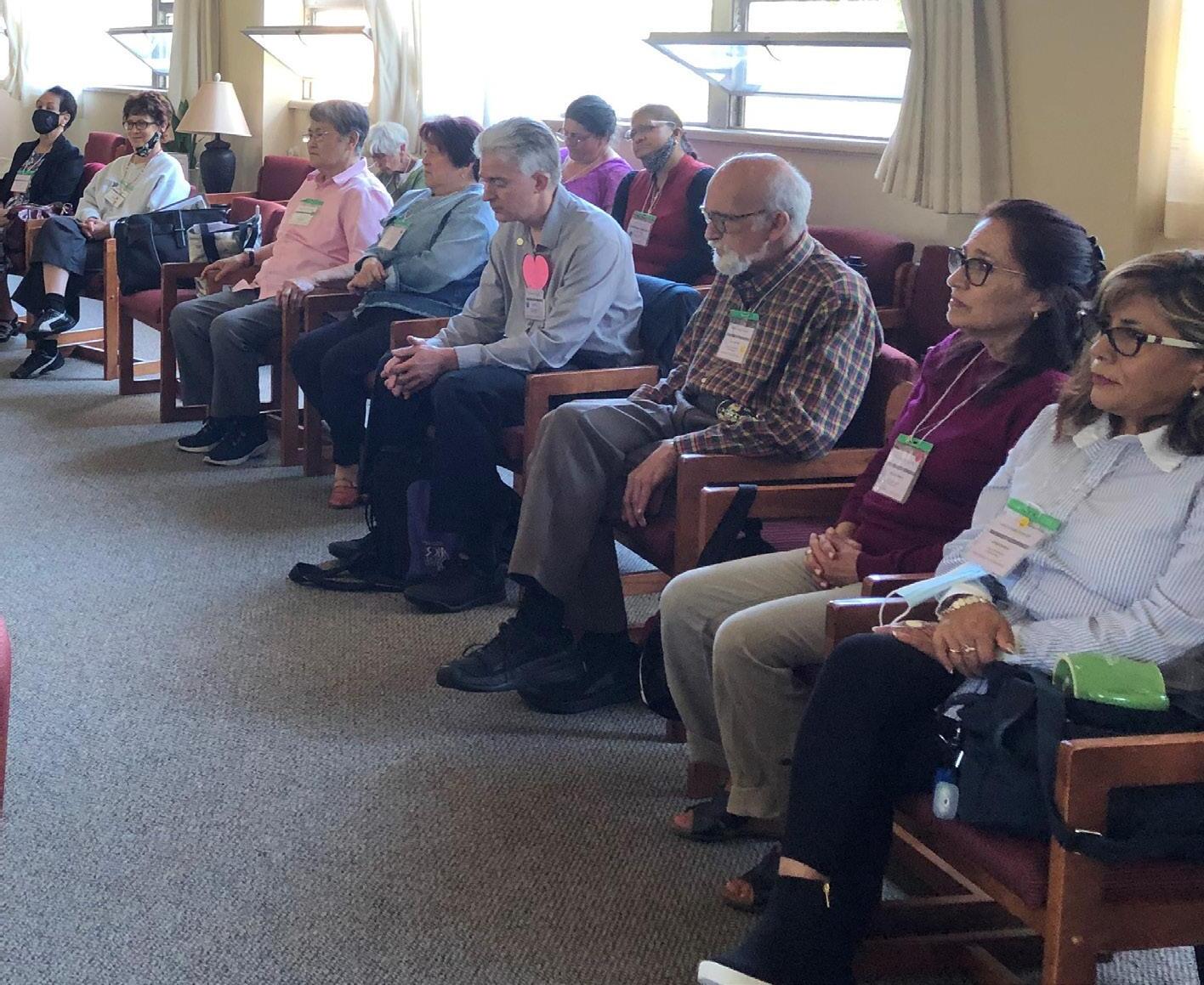
Restorative Justice and Practices - Year In Review 2022 | 11
Photos courtesy of Restorative Justice Ministry
Students, volunteers join efforts to spread Easter joy in the jails
850 cards, some handmade, were included with individual Easter ‘baskets’ of treats























































“Even if you may not know God very well, I can assure you that he loves you very, very much.” These words were written by Ellie, a student participating in the Cards of Mercy project, on a card destined for the San Francisco jails.
The Cards of Mercy project, coordinated by the Archdiocese of San Francisco’s Restorative Justice Ministry, invites schools and faith formation programs to design cards with bright designs and warm messages of hope. These cards are then given to those in custody in the jails for various holidays during the year.

“We must act and show a light of hope, giving assurance to people behind bars that they will never be alone, abandoned, or forgotten by him,” explained Julio Escobar, Restorative Justice Ministry coordinator.

This year students from Our Lady of the Visitacion School (San Francisco), Holy Name School (San Francisco), St. Brendan

Parish (San Francisco), Mater Dolorosa Parish (South San Francisco), St. Patrick Parish (Larkspur) and St. Mark Parish (Belmont) participated in the Easter project, sending in beautifully designed cards filled with messages of love and hope.



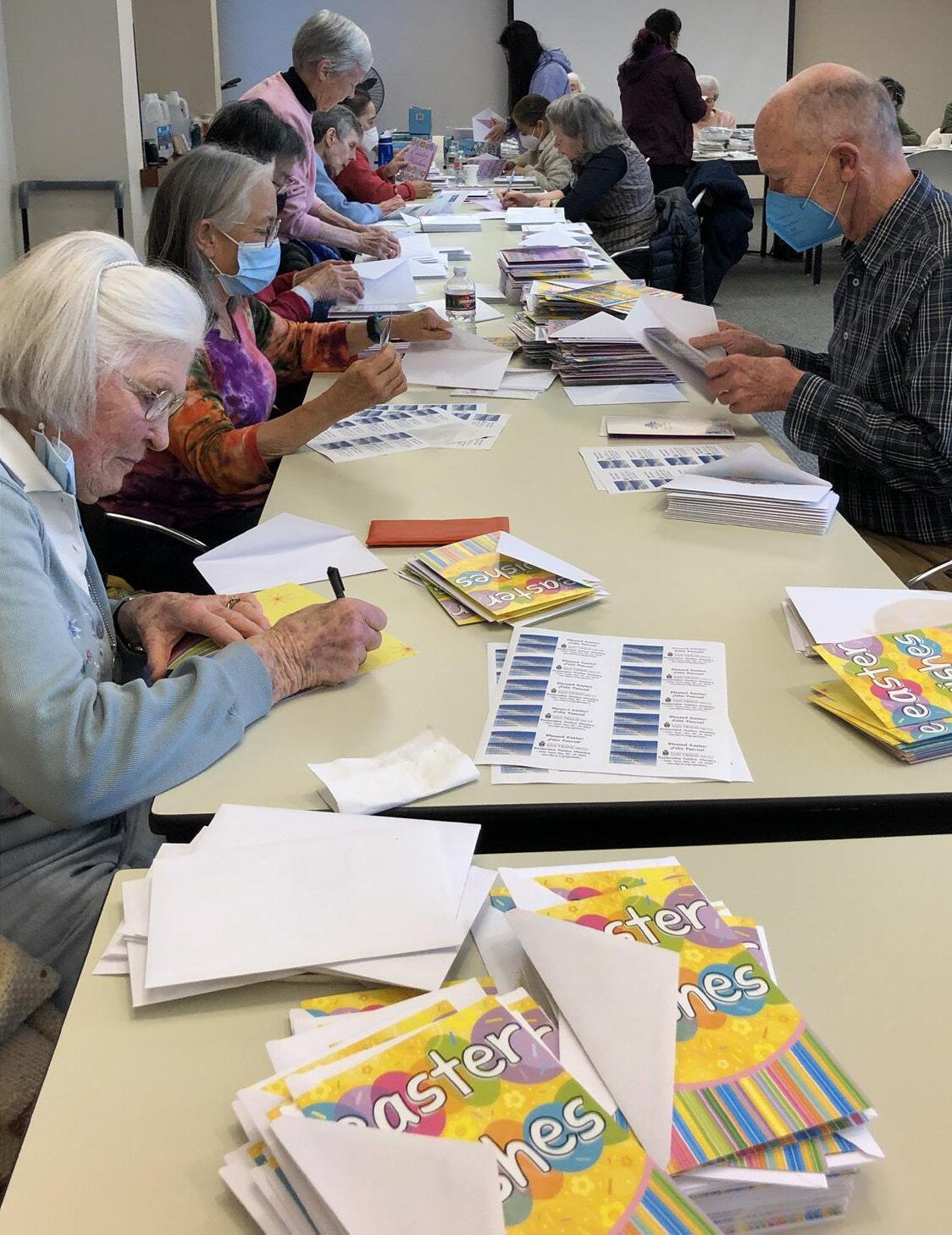
That wasn’t the end of the project, though. On April 13, a group of volunteers — lay and religious, youth and adults — gathered and spent the day assembling goody bags to be distributed inside the jails. The bags included various snacks as well as cards. Some included the handmade cards from the student projects, while others were store-bought, with personalized messages written in those as well. Some of the volunteers wrote messages in Spanish, to better ensure the individuals would get a card that they could understand.
“A card with a nice message gives hope and joy to someone who may not have family,” said Josephine Smith, one of the day’s volunteers.
Story and photos by MELISSA VLACH
Social Action and Digital Media Coordinator Office of Human Life & Dignity Archdiocese of San Francisco
12 | Restorative Justice and Practices - Year In Review 2022
First published, April 14, 2022, sfarch.org/Catholic-SF
During the day of the project, the volunteers formed a sort of assembly line, with some labelling the bags and adding treats, others writing messages, and others counting and sorting cards. Students from Mercy High School and Stella Maris Academy came for shifts during the day, contributing their talents to the project.
“Sending Easter greetings helps bridge the gap between them and us – there really is no them and us,” noted Maureen Lundy, who was volunteering with the project.
Dominican Sister Diane Smith reflected that we all make errors in our lives, although some lead to serious consequences. “Preparing Cards of Mercy for prisoners was a wonderful way to show these poor people that someone cares about them,” she said.

Yolanda Robinson, religious services coordinator for the San Francisco Sheriff’s Department, described the impact these cards have when delivered to those in the jails, explaining that many programs have been cut during the pandemic due to health restrictions. “Since this pandemic, religious services is the only thing that they have to look forward to because nobody else can do anything. So you know, we have people that cry and say, ‘Nobody thinks about us but you guys.’ So, they’re really excited about this,” she said.
Bags were also assembled for the staff of the jails, to spread Easter greetings to them as well.
“The morale in the jail is really, really low right now,” Robinson stated. “So what you’re doing, lifting up the morale by us presenting them with these cards, it’s going to change the atmosphere in that jail.”
The cards were for each of the 850 inmates in the San Francisco County jails at Hall of Justice in San Francisco and in San Bruno. Another 50 were specially designated for the guards and staff of the jails.
The Cards of Mercy project will continue throughout the year, with Mother’s Day and Father’s Day next on the calendar. Visit sfarchdiocese.org/ cards-of-mercy for more details about the project.


Restorative Justice and Practices - Year In Review 2022 | 13
“We must act and show a light of hope, giving assurance to people behind bars that they will never be alone, abandoned, or forgotten by him.”
Scholarships, mentoring offer way back for formerly incarcerated
By
When Jessy Martinez got out of prison two years ago, his plan was to make a new life for himself based on self-improvement, community and love. But if the oddsmakers in Las Vegas were making book on his chances of succeeding, they wouldn’t have been good: The rate of recidivism for men and women leaving state prisons, according to a study by the California Innocence Project, is among the highest in the nation. More than 65 percent wind up back inside after three years.
Martinez grew up in a rough neighborhood in Southern California’s San Fernando Valley. Like a lot of kids in the neighborhood, he joined a gang. He was shopping for clothes with a couple of his buddies in a mall one day.

One of them mouthed off to some other youths. When things heated up, his other buddy pulled a gun and shot two of them. Convicted under the laws in place at that time designed to prosecute gang violence, Martinez – then 16 – received a 100-yearsto-life sentence.
A successful appeal for a new trial and a deal resulted in a lesser sentence. Fifteen years later – after having spent half his life behind bars – Martinez walked out of prison.
“I never believed that I belonged in prison,” he says. “I never believed that I would die there.”
Martinez also never believed he would go to college. He had earned his GED certificate while in prison, but the thought of reaching any higher generated a lot of selfdoubt. (The GED, for General Educational Development, is equivalent to a high school diploma.)
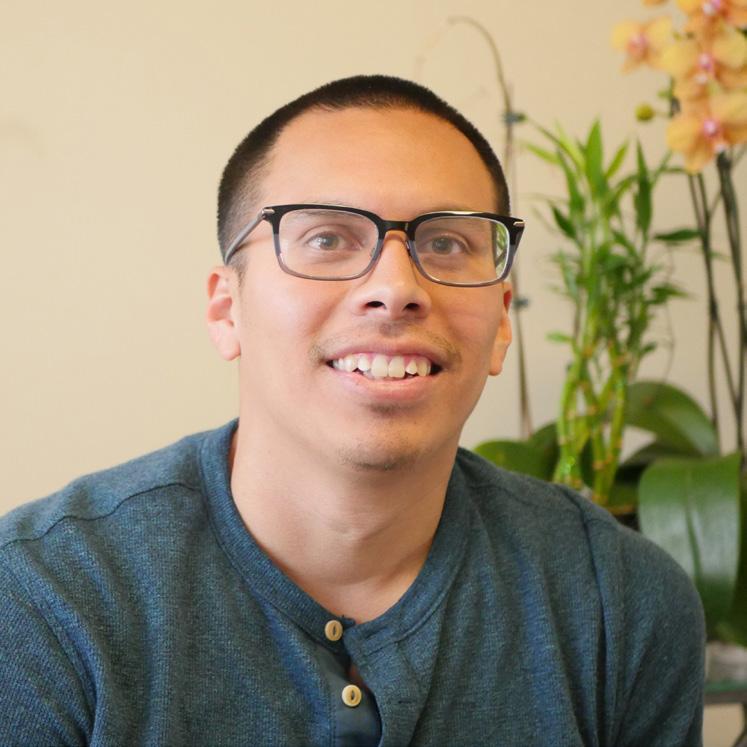
“No one in my family had ever gone to college,” he says, “and I didn’t think someone like myself – who had been in prison and didn’t have money – could attend college.”
Martinez knew that if he were going to do it, he would need help. He found it in a relatively new program called Excell Network. Excell Network is a program of the Archdiocese of San Francisco, which oversees the scholarship program and funding. Archdiocesan Restorative Justice Ministry Coordinator Julio Escobar designed and oversees the program, assisted by staff of the Office of Human Life & Dignity and support from the archdiocesan finance department.
Dedicated to helping formerly incarcerated men and women reach their educational and career goals, Excell Network offers, in addition to a scholarship stipend, an array of services – orientation, workshops on health and nutrition and time management, and spiritual support. It also provides a link to crucial resources such as housing and employment.
DEACON DANA PERRIGAN March 21, 2022 Writer | Book Author
................................................................................................. 14 | Restorative Justice and Practices - Year In Review 2022
Photos courtesy of Restorative Justice Ministry
“Our approach is the same as the father in The Parable of the Prodigal Son,” says Escobar. “We’re helping people change their lives and getting them the resources they need to do that.”
The archdiocesan Restorative Justice Ministry works closely with Excell Network, which was founded in September 2020 by Escobar and is dedicated to helping adults on parole and probation build new lives.
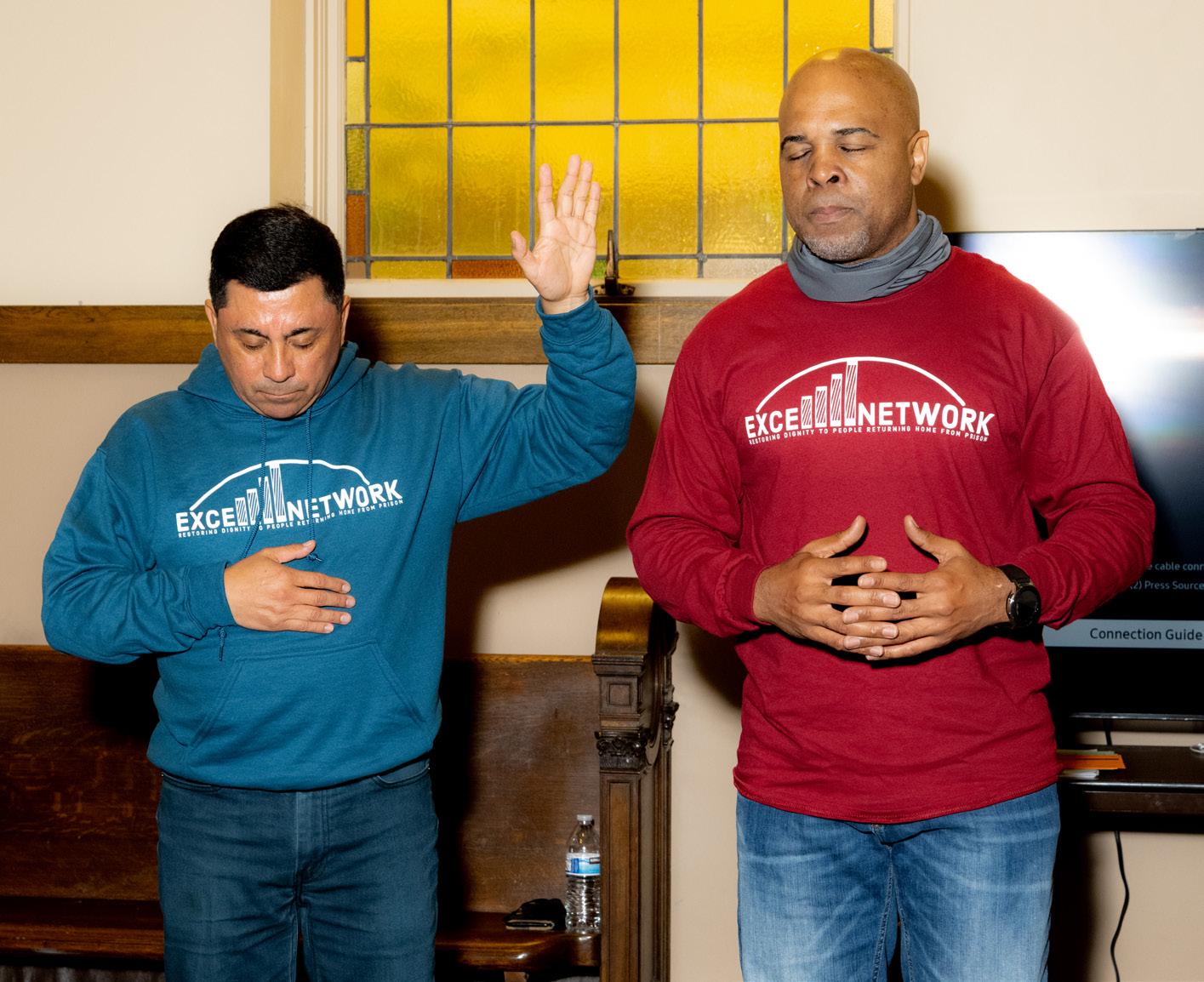
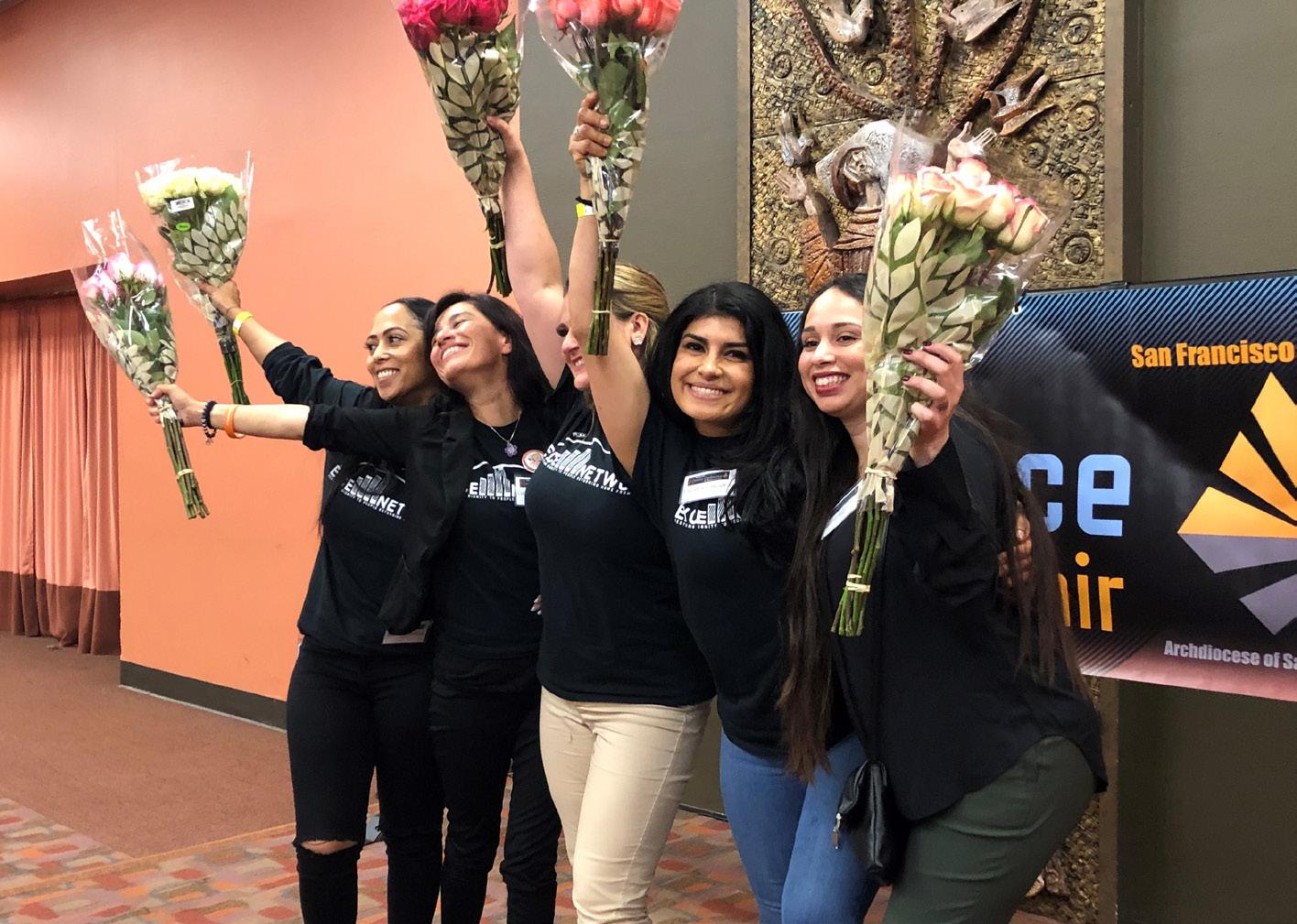
The actual scholarship stipends are from a renewable $22,500 annual grant from the U.S. bishops’ Catholic Campaign for Human Development, which has as its goal empowering those who are poor and disenfranchised to become independent contributing members of society.
In addition to the staff and infrastructure from the archdiocese, which are funded through the Archdiocesan Annual Appeal, Excell Network sells T-shirts, sweatshirts and other merchandise on its website (excellnetwork.org) and at its monthly breakfast meetings. It also offers subscriptions to its quarterly magazine, which contains profiles of students in the program.
“We invest in them,” says Escobar, “and they become productive citizens.”
Currently, 25 students are in the program. Many say one of Excell Network’s most valuable roles is fostering a sense of community through its retreats and monthly breakfast meetings. The students support one another in their struggle –often in very challenging circumstances – to create positive and productive lives.
“It’s very powerful,” says Martinez. “It motivates me knowing that I have a support network – a network of friends who are positive, who I can call on. We share stories and help each other.”
“It’s more than just the financial support,” says Bobby Jones-Hanley. “It’s having a network of people that you can call on to help you deal with school, personal problems, making a resume, filling out forms.”
A former Excell student, Jones-Hanley took some time off from school to create his own nonprofit, Pure1, which launched Jan. 20. Its mission, he says, is to help reentry and homeless people gain financial stability through fast-track career development programs, with support and collaboration from key service providers. Jones-Hanley now serves as an Excell Network volunteer.
Excell Network student John Cunningham Jr. says the experience of reentering society after years in prison can be frustrating. Navigating the oftenconfusing process of enrolling in college, in addition to finding a job and a place to live, can seem daunting.
“Education is key,” says Cunningham, who graduated from San Francisco State University in the fall of 2022. “But you have to have a great support system because it can be overwhelming.”
Julio Escobar (left) Founder of Excell Network and John Cunningham (right) an Excell Network student
Restorative Justice and Practices - Year In Review 2022 | 15
From Left to Right: Nicole Bronson, Collette Stroganov, Heather Leach, Daisy Gonzalez and Cynthia Lozano; Excell Network students
In addition to attending college, Cunningham works as a facilitator, workshop coordinator and supervisor at Rubicon Programs, a nonprofit headquartered in Richmond, whose mission is to break the cycle of poverty in East Bay communities.


“Excell Network has been a great experience,” says Cunningham. “It’s not only helped me, but it’s allowed me to help others. It’s also helped me by opening up opportunities for me that otherwise I would never have experienced.”
Cunningham recently completed an internship in the Willie L. Brown Fellowship program, in which he worked directly with Shamann Walton, president of the San Francisco Board of Supervisors, on the project tasked with reinventing the city’s juvenile justice system.

A common characteristic among Excell Network students, says Escobar, is a willingness and desire to help others.
Not long after being released from prison, Lilliana Gonzalez started working at Hospitality House in the Tenderloin in San Francisco. As a case manager in the employment unit, she assists those who are experiencing homelessness find work. She helps them with resumes, cover letters and applications. Her own experience of needing help, she says, makes it easier for her to understand and aid her clients.
“I love my job,” she says. “I love helping people.”
When he was released from prison three years ago, Omar Breedlove decided to go to college and work. After graduating from City College of San Francisco with an associate degree in behavioral sciences, he was accepted into a highly competitive social work academic program at San Francisco State University. While going to school, Breedlove works as a peer counselor with RAMS (Richmond Area MultiServices), which contracts
with the San Francisco Department of Public Health to do street outreach. Responding to nonviolent 911 calls, Breedlove occasionally encounters some of the same people he used to hang out with.
“My life has become useful,” he says. “It has purpose.”
So, says Martinez, has his. The young man who didn’t think he would be able to go to college is now a student at San Francisco State University. He also works part time as a peer case manager in the University of California, San Francisco’s Citywide Case Management Program, helping clients navigate the course of their treatment and recovery.
“It’s therapeutic,” says Martinez. “When I was young and going through a lot, I wished that I had a mentor, someone I could talk to and give me guidance. I never had that. Now, I tell myself that I could be that for someone else.”
From Left to Right: John Cunningham, Miguel Infante, Duc-Trung Tong and Jessy Martinez; Excell Network students
Jessy Martinez, an Excell Network student
16 | Restorative Justice and Practices - Year In Review 2022
John Cunningham, an Excell Network student



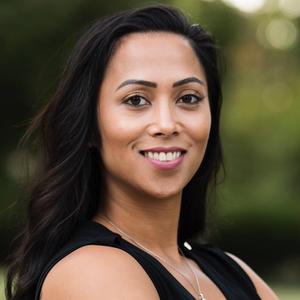
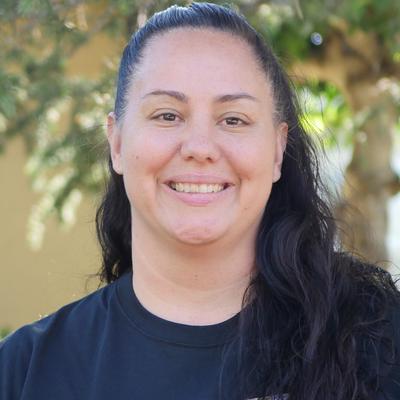
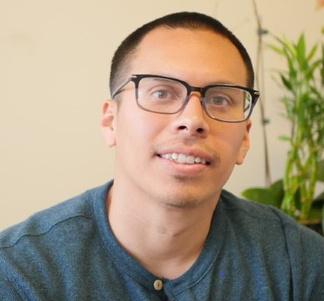




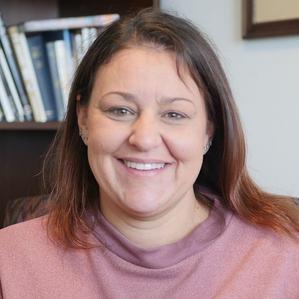



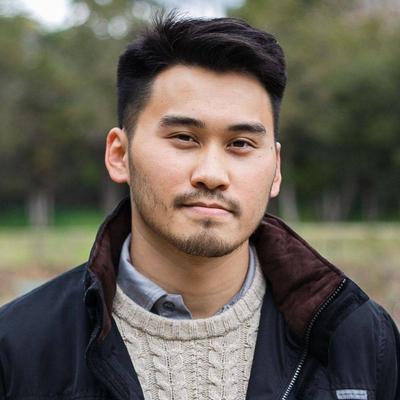
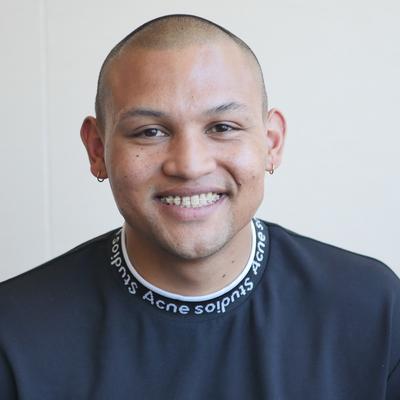


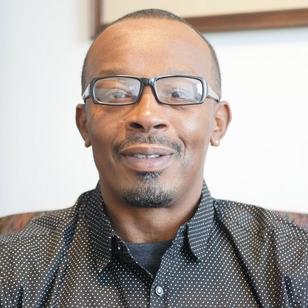










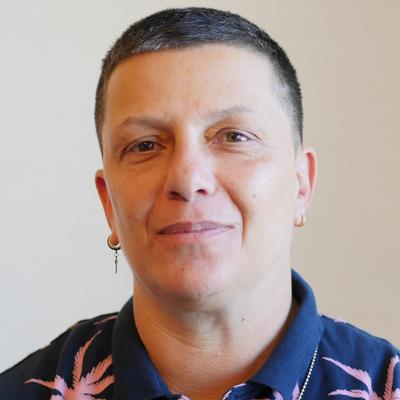
S T U D E N T S O F T O D A Y E X C E L L N E T W O R K . O R G L E A D E R S O F T O M O R R O W 2 N D S A T U R D A Y O F E A C H M O N T H 8 : 0 0 A . M . S T . A G N E S J E S U I T P A R I S H 1 0 2 5 M A S O N I C A V E N U E S A N F R A N C I S C O , C A 9 4 1 1 7 3 R D S A T U R D A Y O F E A C H M O N T H 8 : 0 0 A . M . S A I N T M A R K C A T H O L I C C H U R C H 3 2 5 M A R I N E V I E W A V E N U E B E L M O N T , C A 9 4 0 0 2 L I S T E N T O T H E I R S T O R I E S B R E A K F A S T W I T H U S A N D S U P P O R T T H E M C H R I S T I G R O V E S A N T A R O S A J U N I O R C O L L E G E O M A R J A M A L B R E E D L O V E S A N F R A N C I S C O S T A T E U N I V E R S I T Y A D R I A N L E W I S S A N F R A N C I S C O S T A T E U N I V E R S I T Y R O D N E Y T H O M P S O N S A N F R A N C I S C O S T A T E U N I V E R S I T Y J E F F A L S B O R G S A N F R A N C I S C O S T A T E U N I V E R S I T Y J A C K Y B R O W N S A N F R A N C I S C O S T A T E U N I V E R S I T Y E L I Z A B E T H V A S Q U E Z A R I Z O N A S T A T E U N I V E R S I T Y ( O N L I N E ) K R I S S O S A S A N F R A N C I S C O C I T Y C O L L E G E L U C A S C R U Z A C A D E M Y O F A R T U N I V E R S I T Y D A I S Y G O N Z A L E Z S A N F R A N C I S C O S T A T E U N I V E R S I T Y D A R I O S I F U E N T E S S A N F R A N C I S C O C I T Y C O L L E G E D U C - T R U N G T O N G S A N F R A N C I S C O S T A T E U N I V E R S I T Y N I C O L E B R O N S O N S A N F R A N C I S C O S T A T E U N I V E R S I T Y K A T H R Y N R O M A N S A N T A R O S A J U N I O R C O L L E G E J O H N C U N N I N G H A M S A N F R A N C I S C O S T A T E U N I V E R S I T Y Y U N I A R I V E R A G U A R D A D O F I V E K E Y S C H A R T E R S C H O O L J E S S Y M A R T I N E Z S A N F R A N C I S C O C I T Y C O L L E G E H E A T H E R L E A C H S A N F R A N C I S C O C I T Y C O L L E G E J O S E P H K R A U T E R S A N F R A N C I S C O S T A T E U N I V E R S I T Y J E N N I F E R D I C K E R S O N S A N F R A N C I S C O S T A T E U N I V E R S I T Y G E R A L D R E A D E R S A N F R A N C I S C O C I T Y C O L L E G E C Y N T H I A L O Z A N O S A N F R A N C I S C O C I T Y C O L L E G E M I G U E L I N F A N T E C A Ñ A D A C O L L E G E A L L E N B U S T O S S K Y L I N E C O L L E G E W A L T E R H I D A L G O S A N M A T E O A D U L T S C H O O L L I N D A H U R S H M A N U N I V E R S I T Y O F S A N F R A N C I S C O Restorative Justice and Practices - Year In Review 2022 | 17
Restorative Justice Breakfast Debuts at St. Mark’s Church
Social Action and Digital Media Coordinator Office of Human Life &






First published, February 22, 2022, sfarch.org/Catholic-SF
St. Mark parishioners filled the hall at the Belmont parish as the parish hosted the first of a series of monthly breakfasts to support the Restorative Justice Ministry scholarship program for students who are on probation or parole.
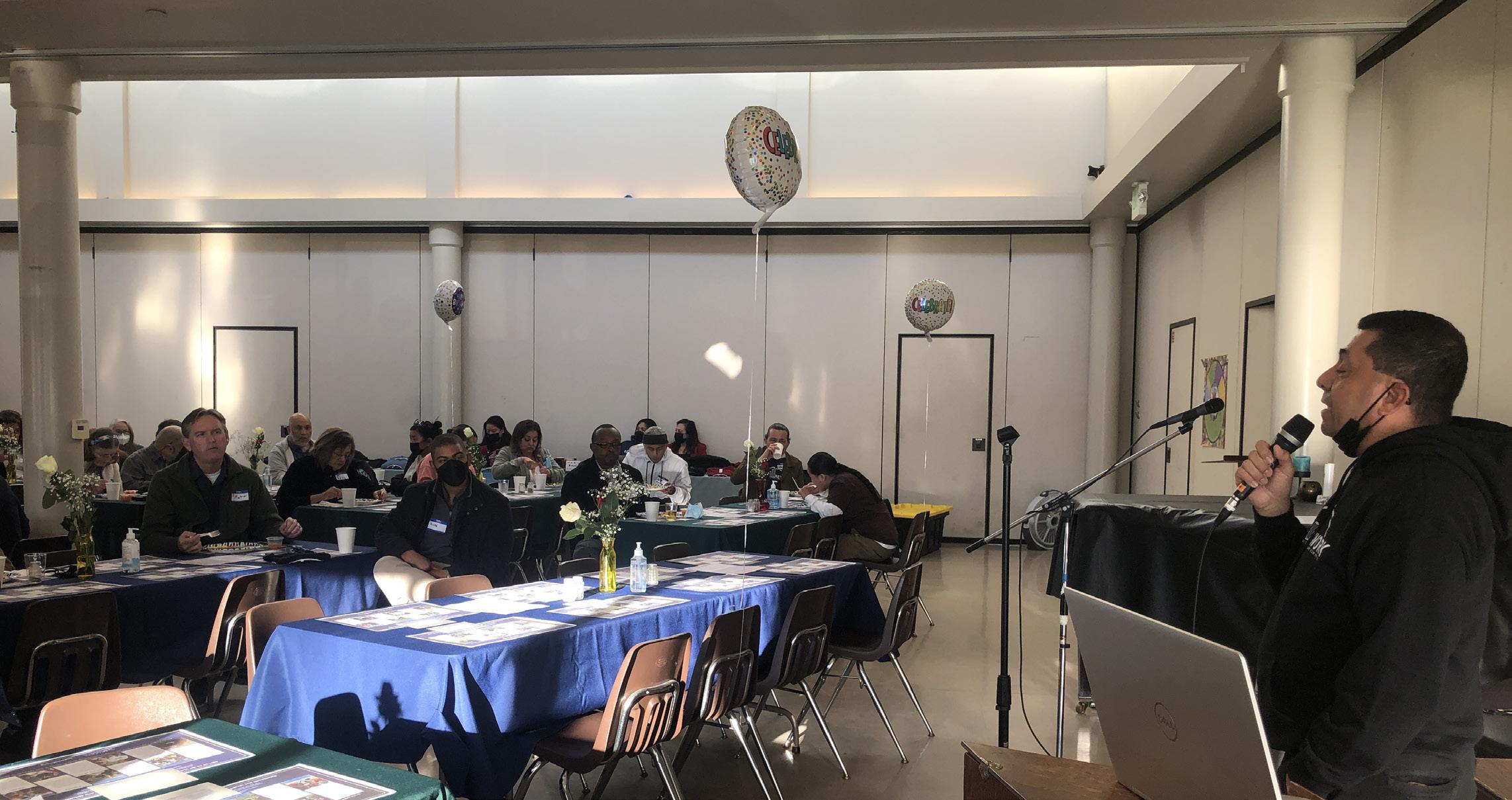
Father Angel Quitalig, pastor of St. Mark, opened the Feb. 19 event with a prayer centered on themes of social justice, praying in part, “We graciously ask You to pour out Your spirit on our parish and fill us with Your grace to be instruments of peace and charity to all those whom You place in our path who are less fortunate, defenseless, marginalized, or forgotten.”
Following this, Julio Escobar, Archdiocese of San Francisco Restorative Justice Ministry coordinator, described the program, which provides not just financial support, but also a network of emotional and life-skills support for students.
“We have been praying the Social Justice Prayer every third Saturday of the month since last year and so there is awareness and concern for the plight of our less fortunate brothers and sisters, including the incarcerated,” explained Dinna Bayangos, parish communications coordinator, who helped plan the event.
“Hosting the Excell Network breakfasts brings our community together in living out this prayer.”
Bill Mallet, a parishioner at St. Mark, was part of the effort to bring the breakfasts to the parish. He has been involved with the scholarship program and other parts of the Restorative Justice Ministry and wanted the program to be part of the parish’s social justice ministry.
“So many times I wanted to say, ‘This isn’t worth it,’ but God showed up for me every single time.”
Daisy Gonzalez, Excell Network student
Story and photos by MELISSA VLACH
Dignity Archdiocese of San Francisco
18 | Restorative Justice and Practices - Year In Review 2022
“I think social justice and restorative justice matters all over the Bay Area. It’s critical to all communities in the Bay Area,” he stated.
Mallet described how meeting the justiceinvolved students changes perceptions about these individuals. “You meet them, you find out what their dreams are, you find out how strong they are, how brave they are, and how generous they are, and now they are simply people who need our help. They’re no longer a label,” he said.



Each breakfast features a student speaker, who tells his or her story and answers questions from those in attendance. For this breakfast the speaker was Daisy Gonzalez, who described growing up in a small town where she learned about the world of drugs at a very young age.

“The drugs, they really change the way you think and the person that you are,” she said.
It wasn’t until she was facing extensive federal charges that she began to make changes in her life, knowing that she needed to be there for her daughter. She took part in treatment programs, focused on her education, and worked to get her daughter back from foster care. Even though she was facing many challenges, she cites her faith as something that supported her through it all.
“So many times I wanted to say, ‘This isn’t worth it,’ but God showed up for me every single time.”
Gonzalez is now focused on her future goals and trying to make sure she meets the needs of her daughter, of whom she regained custody. For all she has faced, she says that she wouldn’t change the things that have happened, explaining that she draws on those experiences in her current work in social services. “Your pain can help you pull someone out of their pain.”
Parishioners were riveted as they listened to Gonzalez recount her life, and many gave her a standing ovation at the end.
“I’ve never heard a story that hit my heart so much,” commented Jack Murray, who was in attendance.
Although the proceeds from the breakfast support the scholarship program, Mallet agreed that attendees gain as much or more than the students. “For all that we do for the students… we get the greatest benefit,” he said.

St. Mark will host breakfasts on the third Saturday of the month through November of this year. This complements the monthly breakfasts at St. Agnes in San Francisco on the second Saturday of the month.

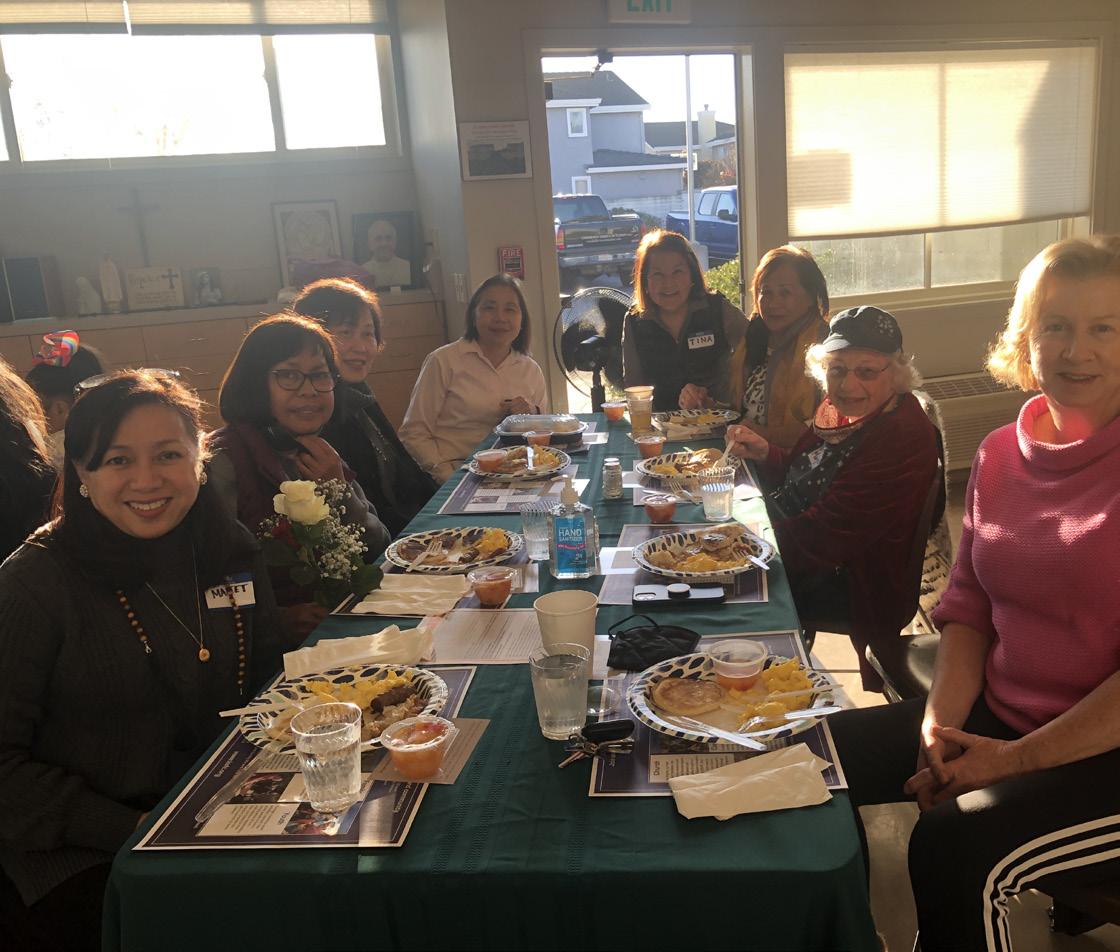
Restorative Justice and Practices - Year In Review 2022 | 19
Sitting in an isolation cell in San Quentin’s Carson Sector commonly referred to as “The Hole” by the prison’s inmates — Miguel Infante asked himself a single question: Where, he wanted to know, was his life going?
Based upon where it had been, the answer was clear: Unless something changed, he would remain caught up in the same brutal cycle of gang violence, drug addiction and incarceration until it ended.
It had started out in East Palo Alto, where Infante grew up, the youngest of four children raised by their single mother. It was a poor neighborhood, where joining a gang — for a lot of kids — was more a rite of passage than a conscious decision.

“It was a rough place,” says Infante. “There was a lot of violence, a lot of drugs — in the ‘90s, especially.”
When he was 13, he joined a gang. Later, his grades started to decline. They eventually got so bad that he was kicked out of high school his junior year.
“That’s when I really started running the streets,” says Infante. “I started using and it became a habit. Since then, it became a cycle of being strung out on drugs and going to prison.”
During the 16 years or so following high school, Infante racked up four prison terms. Not long after beginning the last one in 2016, while in solitary, he decided that he wanted his life to move in a different direction. He was approaching the age of 30. It was not too late.
“I made some tough decisions,” he says. “I decided to distance myself from certain people. I got clean. I got back into my faith. The hardest part was distancing myself from the gang life.”
Infante began to take advantage of what prison offered. He joined all the self-help groups that were available. He enrolled in classes.

“When I left Bellarmine, that’s when my education stopped,” he says. “I regretted that. Education became a priority.”
So did his faith. Growing up, he had been in the habit of going to church with his mother every Sunday. But there had been no room for Christian morality in the gang lifestyle. During the year he spent in solitary, he says, it started coming back.
MIGUEL INFANTE
By

“I made some tough decisions. The hardest part was distancing myself from the gang life.”
EXCELL NETWORK STUDENT
DEACON DANA PERRIGAN Writer | Book Author
Story first published in Excell Network Magazine Spring 2022 Issue
Photos courtesy of Miguel Infante
20 | Restorative Justice and Practices - Year In Review 2022
Photo courtesy of Miguel Infante
Infante hopes, one day, to become a lawyer. While it can be difficult for someone, like himself, who has felony convictions on his record, it is not impossible. In an effort to overcome that hurdle, he has applied to the Rising Scholarship Program a group of attorneys who work, pro bono, to expunge the records of those seeking a law career.

 Photo courtesy of Miguel Infante
Photo courtesy of Miguel Infante
Restorative Justice and Practices - Year In Review 2022 | 21
Photo courtesy of Miguel Infante
JOSEPH KRAUTER
By
Joseph Krauter always felt that there was something wrong with him, but he didn’t learn what that something was until he was serving a 15-year-to-life sentence in prison for second-degree murder.

“Prison saved my life,” he says. “Until then, I firmly believed I was going to die.”
Krauter was born and raised in Bakersfield, California. His parents divorced when he was 10. While his two sisters remained with their mother, he went to live with his father, a self-employed electrician who was often away from home.


“So I basically raised myself,” he says. “I pretty much taught myself to cook and clean, and I learned my morals and ethics from ‘Sesame Street’ and cartoons.”
Prior to the divorce, Krauter had been a good student. Afterward, he had trouble focusing in class, but later, in high school, he discovered that he had a passion for theater. After graduation, he continued to pursue his passion at Bakersfield College, where he immersed himself in his theater work and made friends. He volunteered to assist on productions at the city’s local theater.
“On paper, everything looked good,” he says. “Off paper, my life was a mess.”
Often anxious and depressed and feeling bad about himself, Krauter says
he was always trying to rescue people — mostly his friends, whom he considered family.
“This compulsion led me to help and take care of others to my detriment, my self-destruction,” he says. “I over-extended myself. My health and my finances suffered.”
Krauter’s propensity to rescue others continued, even after his father lost their house. He spent the next year in survival mode, sleeping in his car or on friends’ sofas. While finally finding a job and a place to live improved his situation, he couldn’t shake the anxiety and chaos surrounding his life. His health deteriorated.
“I was eating myself to death,” he says, “chain-smoking cigarettes, unable to sleep.”
It was at this point that a friend approached him with the offer of a job.
“I asked him what kind of job?” recalls Krauter. “He told me that there was this guy raping and assaulting a girl in Redding, California, and that the cops were ineffective.”
Krauter took the job. He and two others drove up to Redding and killed the man. They were caught, minutes later, leaving the scene.

“On paper, everything looked good... Off paper, my life was a mess.”
EXCELL NETWORK STUDENT
DEACON DANA PERRIGAN Writer | Book Author Story first published in Excell Network Magazine Spring 2022 Issue
Photo courtesy of Joseph Krauter
Photo courtesy of Joseph Krauter
22 | Restorative Justice and Practices - Year In Review 2022
Photo courtesy of Restorative Justice Ministry
Then 24, Krauter, who had no criminal record, was eventually convicted, and sent to prison.
“I knew that something was really wrong with me, something broken, something that got me there,” says Krauter. “My goal was to figure out what was wrong with me.”
His attorney wanted him to be tested for Asperger’s Syndrome — a developmental disorder related to autism — but it was a book recommended to him by a friend of his mother’s that started him along the path to self-discovery.

“It spelled out my entire life,” says Krauter. “It lit a fire in me to find out if it was true. I began the journey of my life.”
It was a journey that took years and led to him being diagnosed with autism — a complex, lifelong developmental disability that usually appears in early childhood and that affects a person’s social skills, thought processes, relationships, communication and self-control.
“It was a relief to have the truth revealed about myself,” says Krauter, “and then to begin therapy and treatment.”
Five years of intense therapy, says Krauter, gave him the tools he needed to mentally and emotionally self-regulate.
During that time, he noticed a gradual and significant change in his behavior. His health — mentally and physically — improved.
After serving 14 years behind bars, Krauter was paroled from San Quentin two years ago. Not wanting to return to his old environment, he took up residence in a halfway house in San Francisco where he began the difficult job of building a new life for himself.

Along the way, he heard about Excell Network and decided to apply.
“I really like it,” he says. “I like the people, and I wish there were more groups that had the same drive.”
Currently, Krauter works part-time as an editor/ journalist for The Humans of San Quentin, a nonprofit whose mission is to raise public awareness of the humanity of prisoners. He is pursuing a bachelor’s degree in creative writing at San Francisco State University. He is also studying IT desktop training and programming and serves as an advocate for autism detection and treatment for the incarcerated.
When asked what advice he would offer to others in their struggle, Krauter says it would be “always to have hope, to have faith — even if it’s only an ember of belief that things can get better — because that belief will gain momentum and counterbalance the bad in life and eventually overtake it.”
Photo courtesy of Joseph Krauter
Restorative Justice and Practices - Year In Review 2022 | 23
Photo courtesy of Joseph Krauter
RESTORING HOPE
Celebrating its 10th anniversary with record registrations of more than 900, the Reentry Conference and Resource Fair took place on Friday, September 9, offering hope and opportunity to crime survivors, justice-involved youth and adults, and families with incarcerated loved ones.

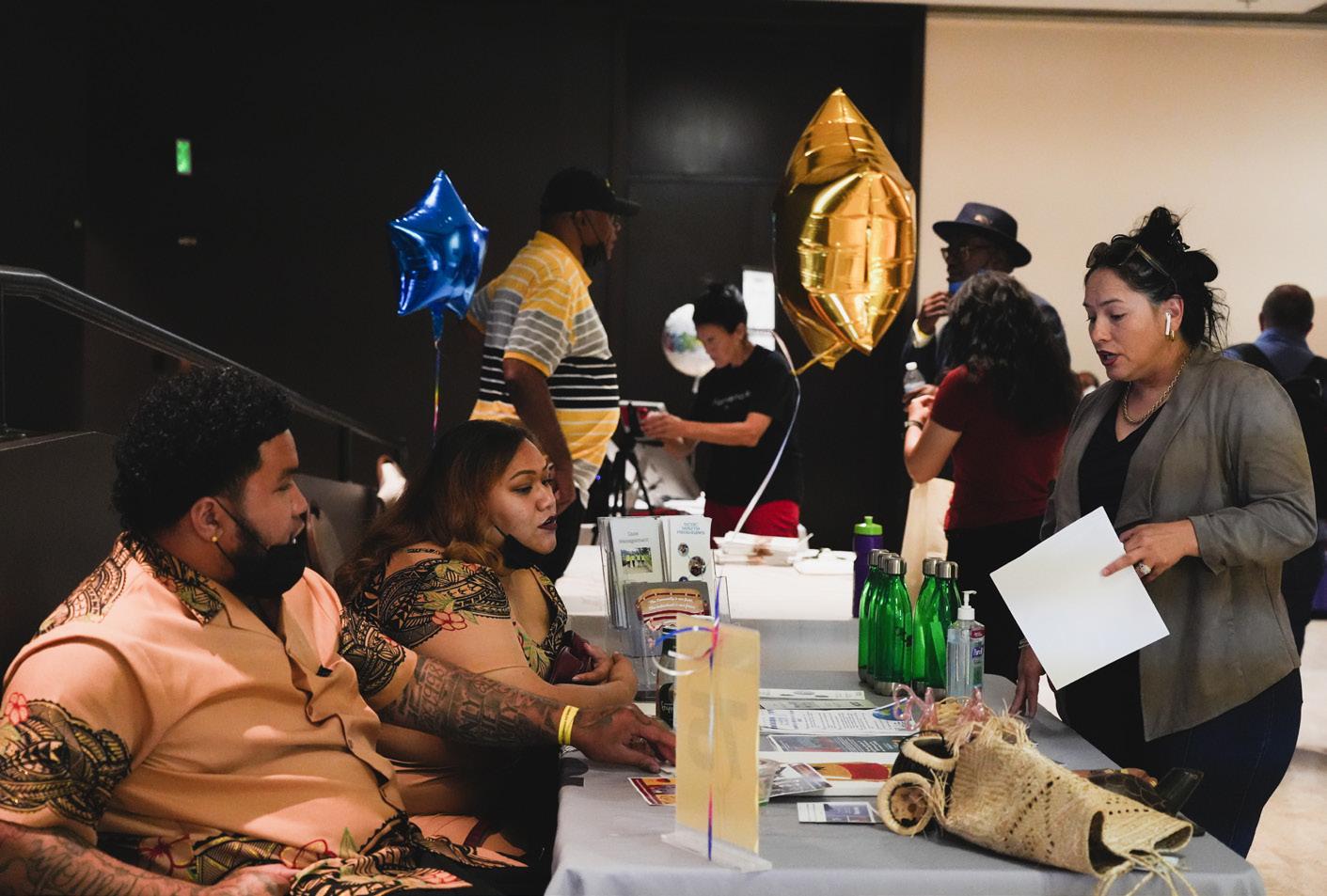
“The way you restore hope is by inspiring hope,” said Julio Escobar, Reentry Conference organizer and leader of the Restorative Justice Ministry at the Archdiocese of San Francisco. “Our event theme is to empower leaders looking for a change. Yet,
for us to be leaders, we need to first be followers. We need to be good listeners, to be humble, and to recognize the dignity of every person created in the image and likeness of God. This foundation enables us to evolve into great leaders.”
NEW JOB FAIR
New to the 2022 event was a robust job fair, providing attendees with a wide range of employment opportunities throughout the Bay Area.
Jasmine Alvarez of San Francisco’s Pretrial Diversion Project said that the job fair was super helpful. As she engages in therapy with clients, one of the biggest stressors for them is joblessness and being unhoused, and so adding the job fair at the Reentry Conference helps to meet her clients’ basic needs and improves their mental health.
First published, September 10, 2022 sfarch.org/Catholic-SF
“It is amazing to have all these employment resources handy to support my work with reentry clients as we engage in career exploration,” she said.
Michael Scott, a senior manager at Goodwill Industries, said that he is dedicated to helping people who are looking for second chances. Goodwill has a reentry program with job preparation, job search and job training skills that help people to either rebuild their careers or start on a new career pathway to be successful in their communities and help their families to put food on the table.
More than 100 organizations were represented at the conference, offering their services to attendees, including the Success Center, which offers training and education resources for attendees.
“We offer jobs that are reentry friendly, said Loria Price, career center director at Success Center. “We break down the barriers for services including assessments, counseling, GED training, childcare, food, clothing and other support services.”
 Story by PETER MARLOW Executive Director of Communications And Media Relations
Photos By FRANCISCO VALDEZ Digital Media Specialist Office of Communication Archdiocese of San Francisco
Story by PETER MARLOW Executive Director of Communications And Media Relations
Photos By FRANCISCO VALDEZ Digital Media Specialist Office of Communication Archdiocese of San Francisco
24 | Restorative Justice and Practices - Year In Review 2022
Conference attendee, Majeid Crawford, executive director of the New Community Leadership Foundation, has benefitted from the services of the Success Center. His organization supports Black-owned non-profits, businesses, and Black and other disenfranchised artists in marginalized communities.



“I participated in the Success Center’s year-long Leadership Program, and it definitely changed the trajectory of where I am trying to go as a leader and where I want to take my organization,” said Crawford. “From training on how to register with the California State Registry, to non-profit compliance protocols, the support offered from the Success Center changes people’s lives for the better.”
PRAYER REFLECTION
The event began in prayer and reflection.
“Today, we remember those who have lost their
lives to violence and for those offenders who are in prison,” said Father Frank Tinajero, of the Society of the Divine Word in Los Angeles. “May they recognize there is a better way to live….Despite the messiness of our lives, our Creator will use these situations to recreate and make anew….We come together as people created in God’s image and likeness….May His spirit move us and energize us…. With great joy, we begin a new day and ask God to guide, inspire and walk with us in our journey, filling us with energy and insights.”
Father Tinajero closed with the Peace Prayer of St. Francis, the patron saint of San Francisco.
ATTENDEE FEEDBACK
“Collaboration!”
“Networking!” “Serving those in most need!”
“Changing the narrative!” These are the answers Julio Escobar received when asking attendees to shout out their reasons for attending the event.
The Reentry Conference and Resource Fair is unique by bringing together victims, offenders and the community. Sponsored by the Archdiocese of San Francisco’s Office of Human Life and Dignity and its Restorative Justice Ministry, the event took place at the Cathedral of St. Mary of the Assumption. The conference offers attendees educational and social service resources, victim services, faithbased reentry support and
other preventative and healing resources from law enforcement, government agencies and non-profit institutions.
“Mediocrity is not an option…. we always have to do the best,” said Escobar. “We want to make it easier to secure the services and support that attendees need to be ethical leaders and compassionate citizens in serving the common good.”
Restorative Justice and Practices - Year In Review 2022 | 25



RESTORATIVE JUSTICE MINISTRY FREE ADMISSION, PARKING, CONTINENTAL BREAKFAST AND LUNCH DOORS OPEN 7:45 AM INFORMATION (415) 614-5572 rjministry@sfarch.org www.sfarch.org/rjministry C R E A T I N G B R I D G E S F O R S U C C E S S F U L R E I N T E G R A T I O N FRIDAY, SEPTEMBER 8, 2023 8:00 A.M. – 4:00 P.M. H U M A N L I F E A N D D I G N I T Y SPONSORED BY S A I N T M A R Y ’ S C A T H E D R A L E V E N T C E N T E R 1 1 1 1 G O U G H S T R E E T S A N F R A N C I S C O , C A L I F O R N I A 9 4 1 0 9 26 | Restorative Justice and Practices - Year In Review 2022
On the morning of the second Saturday of every month, a group of people sit down at tables set up in the back of St. Agnes Church in San Francisco and have breakfast together. It’s been going on for a year now and, judging from some of the comments of those in regular attendance, more than food is being served at these gatherings.
“They changed my life,” says one.
“They give me hope,” says another.
“They let me know that change is possible,” says a third.
Designed to provide spiritual and emotional — as well as physical — sustenance, the monthly breakfasts are an important part of Excell Network — an innovative program dedicated to, in the words of its founder, Julio Escobar, “restoring the dignity of people returning home from prison while motivating them to reach their full potential.”
While those accepted into the program receive some financial assistance to help them achieve their educational goals, says Escobar, Archdiocese of San Francisco Restorative Justice Ministry coordinator, the monthly breakfasts offer them something else.
“It gives them an opportunity to share their stories in public,” he says, “and while doing so, exposing them to an audience — the parishioners of a particular church.”
Escobar says he got the idea for the monthly breakfasts from John 21:12, in which Jesus appears to his disciples at the Sea of Tiberias and invites them to “Come and have breakfast.” Looking for a church to host the breakfast, he then approached Father George Williams, S.J., Pastor of St. Agnes Church.

“I thought it was a great idea and I immediately offered to host the breakfasts at St. Agnes,” says Father George.
Having served in detention ministry for 27 years — 10 of which was as a chaplain at San Quentin State Prison — Father George says he understands the profound need for effective re-entry programs for those who have been incarcerated.
“I think the best part of it has been getting to hear the stories of the young people who have come out of the criminal justice system and are doing such good things,” he says. “You don’t see that often enough.”
Father George remembers a few of the students from his days at San Quentin, and he is gratified to learn they have made such positive changes in their lives.
“I can’t say enough good things about Julio,” he says. “He’s just out there actually doing the work of the Gospel.”
Prior to founding Excell Network in the fall of 2020, Escobar served for 17 years as executive director of Communidad San Dimas — a nonprofit which ministers to youth in the juvenile justice systems in San Francisco, San Mateo and Alameda counties. The central idea of fostering a sense of community among volunteers and students, he says, was a key element of the Communidad San Dimas ministry.
The one-and-a-half-hour breakfast format, says Escobar, is all about building community. Following an opening prayer, students and parishioners sit down together to a catered breakfast. After each member of the audience introduces themselves, an Excell Network student tells his or her story, followed by a question and answer period. The remaining 30 minutes is reserved for networking.
ST. AGNES CHURCH IN SAN FRANCISCO celebrates the first year of Excell Network’s Breakfasts
By DEACON DANA PERRIGAN Writer | Book Author
Melissa Vlach says she has enjoyed meeting the students and hearing their stories during the past year.
“I find it inspiring,” she says. “So many of the students — they’ve faced so many challenges. It would be easy for them to become bitter, but they use the pain they’ve been through to help others.”
Vlach, who works with Escobar as a social action and digital media coordinator at the Archdiocese, produces videos of the students that are featured on the Excell Network website and writes for the magazine.
Volunteer Jan Potts, who uses her expertise as communications director for the Sisters of The Presentation to advise Escobar on communication matters, says she has also been inspired from hearing the stories of the students.
“It’s very compelling,” she says. “When I’m there, I’m so aware of the privilege of hearing their stories. Their openness, their courage, is contagious. I always talk about it when I go home.”
An active parishioner at St. Agnes, Robert Keller heard about the program while taking courses in restorative justice and decided to volunteer. He hopes to encourage more parishioners to attend the monthly gatherings.
“I think it’s great,” he says. “It’s one of the things that give us an example of the success of restorative justice. It’s very inspiring — plus it’s a good, inexpensive breakfast.”
in
Issue Restorative Justice and Practices - Year In Review 2022 | 27
Story first published
Excell Network Magazine, Summer 2022
RESTORATIVE JUSTICE EXCELL STUDENT STATEMENTS & WHY
ELIZABETH QUIROZ
My name is Elizabeth Quiroz and participating in restorative justice breakfasts with Excell Network has literally changed my life. I have discovered that many formerly incarcerated students, like myself, are striving for a better life. Moreover, they do not stop there; they work to give back to the community while using their pain for purpose. Please join us in supporting the Excell Network’s mission and vision of changing lives.
OMAR BREEDLOVE
The Restorative Justice Breakfast gives me hope. When I am there, I feel welcomed, and I am not judged for my past. Instead, I am recognized for my accomplishments and supported as I continue my journey to a successful life. Also, to be with others that have been through similar experiences is very empowering. It lets me know that I am not alone, and that change is possible. I thank God for the blessings that have been bestowed upon me which includes being a part of the community that continues to grow at the Restorative Justice Breakfasts.
NICOLE BRONSON
The Excell Network breakfasts are a time to build new communities and bridge the gaps by broadening each other’s perspectives. I believe the community heals and begins itsrestoration when we share our testimonies and examine the state of our past and existing communities. We have the chance and
opportunity to genuinely connect, change the course, and brighten the future for the next generations that are following and looking up to us. It is a time to culminate resources for a greater purpose and invest positively for those reentering our communities. It is a time to practice the love of God and display what compassion, redemption, and brotherhood exemplify. The Excell Network is a time for fellowship, networking, and unification.
BOBBY JONES-HANLEY
The Restorative Justice Breakfasts are an integral part of Excell Network’s mission. Not only do they help build the leadership and public speaking skills of students, they create a space for building empathy, understanding and community for all who attend. Each month students are able to progress in their personal and professional journey while attendees are able to engage with students, learning from their stories and seeing firsthand the impact of their support. I personally love attending the breakfast and feel they are the glue that holds the program together.
DAISY GONZALEZ
The Excell Breakfasts have made it possible for me to be able to connect with other students with similar backgrounds to mine. This might not seem like a huge deal; however, to me it is because it creates community and gives hope because it shows others that we can move forward and move up. The first time I spoke was in Belmont and I was so very nervous. I had mixed feelings
about sharing my story with a room full of people that I did not know. The experience was beautiful, Julio was there so I felt better once I started speaking and little by little the words just came out. I could sense that the people that were there genuinely cared. It was a great day, speaking about my journey was healing. The parishioners received my story with so much love. I think these breakfasts are important because they bring the people that are helping together with those they help. It allows them to put a face and a story to a name. Thank you for making the breakfast possible.
JOHNCUNNINGHAM
Congratulations Excell Network on our 1-year Anniversary!!!!
I want to thank Julio for having the vision of supporting those impacted by the criminal justice system in our communities. The monthly breakfasts have inspired, encouraged, and enriched my life.
Hearing the testimonies of my brothers and sisters has blessed me and drawn me closer to them all. Meeting those in the community who come out each month to support us is refreshing and gives me renewed hope in humanity. Shout out to Pastor George, the St Agnes Church, Pastor Angel, and the St. Mark’s Church for extending their generous and gracious hospitality to Excell Network. Looking forward to year 2 and beyond!
CHRISTI GROVE
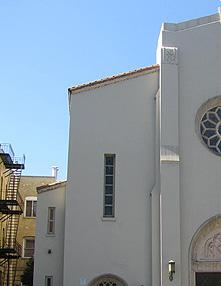
The monthly Breakfasts for me are a place to be inspired.
It brings us together in a safe and supportive environment where we can share, learn and be inspired by our fellow members. We are a group of formerly incarcerated individuals with a past of hopelessness, trauma and a life not worth living. Together we are listening to one another, supporting each other for a brighter future, and showing each other the obstacles around us. Where we started, where we are going and how we are accomplishing a better life beyond our wildest dreams. Being inspired and having hope is what this is for me.
WALTER HIDALGO
For me Excell Network is a place where I can share part of my life. There is no judgement at all, for what happened in the past; with Excell Network as my support team I can move forward. I am surprised by how this program focuses on my goals; it is like a reminder for what is coming next. As Excell Network does...I do believe that Education plays a fundamental role in our life. It is an opportunity to rebuild our future for a better society.
DUC TRUNG TONG
My breakfast experience has been helpful because I am able to connect with my formerly incarcerated community. These brothers and sisters share similar experiences with me and it helps to share information and struggles with one another. I am happy to be able to lean on them when times are difficult. Moreover, it has been a great learning opportunity to speak in front of an audience about my story. I learned the importance of
28 | Restorative Justice and Practices - Year In Review 2022
EXCELL NETWORK BREAKFAST WHY IT MATTERS TO THEM
listening to my body regarding trauma and creating a safe space to share my traumas.
JACKYBROWN
My parents taught me to be loyal and committed to our family no matter what. Of the 8 members of our family, my mother and I survive and thrive for the rest. Today, everyone around me is my family. Why, cause GOD said we are all created in HIS image. For me that is a spiritual connection. I reconnected with my love for becoming a better person, spiritually, emotionally, mentally, and physically .My parents taught me to think before I speak. I have an abundance of energy and it gives me satisfaction using it to help others and myself.
MIGUEL INFANTE
Deo gratias, I recently had the privileged to attend a retreat presided by Father Greg Boyle SJ and the theme of the retreat was “Love is God’s religion”. The Excell network’s objective of education during reentry while reducing recidivism in collaboration with the Catholic values of inclusion, reconciliation and redemption enhances the healing process that is vital to rebuild tarnished relationships and transform communities. Sometimes in life, we are not dealt a fair hand whether it be environmental or socioeconomic, yet despite these challenges one must learn to procure balance physically, mentally and spiritually. The healing process that is expressed at the breakfast demonstrates the vulnerability of the disenfranchised and most
importantly a community willing to nurture and continue with God’s work in the metaphysical approach. I would like to commend the Excell network for its continued success and remind everyone that God’s work is perpetual and much is left to be done.
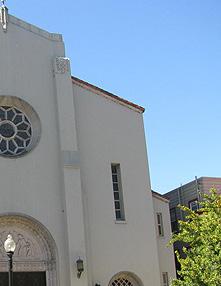
JOSEPHKRAUTER
I have an almost unstoppable thirst for learning. Most often, if I am not learning something I feel as if I am drowning. Excell Network blessed me with the resources to keep learning. I am enrolled in two different schools studying my most intense passions: IT for a great stabilizing career, and Creative writing to pursue my dream of becoming an accomplished author.
This journey has not been easy but it has given me a new aspect of faith and determination that I did not have before. I do not believe that I would have been able to come this far through the nightmare of parole and reintegrating into society without the support from Excell Network. Thank and Bless you all for that you have done for me.
ADRIAN LEWIS
My experience with the Excell Network breakfast has been amazingly positive and supportive. What Julio has created with the Excell Network breakfast is a sense of community particularly for those of us like me who are returning to society from incarceration. It also connects those who are in the community with formerly incarcerated persons and gives
them a view into who we are today and gives us a sense that we are not the sum total of the crimes we committed. We made some horrible decisions in our past but that past does not define who we are as men and women. Moving forward through the Excell Network and participating in a breakfast fundraiser I have met many positive career oriented people who have helped me along my journey of recovery, selfdiscovery and employment. The breakfast also allows us to share our stories and experiences which is extremely healing and cathartic to release some of the trauma by talking about it. I plan to stay connected to the Excell Network and to continue to share my story and journey to help create change and pave the way for those coming after me.
JESSYMARTINEZ
Every month, I look forward to attending Excell’s bi-monthly breakfasts because I am able to interact with friends and meet the most compassionate empathetic people. I am so busy with work and school, so these breakfasts allow me to take a break and connect with friends. The stories that are shared by others are also very inspiring to me, especially as a Returned Citizen. It reminds me that I am not on my own, there is support available, and I also have the capacity to help someone else.
KRIS SOSA
Our Restorative Justice breakfasts are an essential part of the Excell Network family because it creates a supportive community that
fosters unity and solidarity. Students are able to help change the narrative and remove the stigmas society places on formerly incarcerated individuals by sharing their stories, their trials and tribulations, and their transformations. It is a time when donors, students, and other religious community members can come together, share a meal, network for opportunities, and establish life-long connections and friendships.
CALEB ADKINS
The Excell Network breakfasts to me are community, a place where I can come and find unity. The Excell Network breakfasts is a place where I can come and find people who will support me in my struggles. It is an opportunity for all the students to network and for people from the parishes and the community to learn what a needy formerly incarcerated person goes through when trying to reenter society.
ALLEN BUSTOS
The “Excell Network” breakfasts have been a transformative experience for me. Being in community with my peers supports and provides me inspiration to stay motivated in this journey to become an educator and lifelong learner. The stories of my peers allow me to remain humble and I value the interactions with the parishioners! Considering the conditions and traumas we’ve experienced, celebrating our accomplishments and achievements on this platform shows the community that change is collaborative.
Restorative Justice and Practices - Year In Review 2022 | 29
DAISY GONZALEZ
“I just felt like such a big, big monster,” says Daisy. “It’s ugly and it’s crazy, but it’s the truth.”
Sitting in jail, Daisy had time to reflect on things. One of those things was the occasionally desperate, often chaotic, and dangerous direction her life had taken since she was a little girl growing up in Dixon.
“We had a different kind of family ‘cause my family sold drugs,” says Daisy. “It was a small town, and there was a lot of finger-pointing and judging.”
There was also trauma. At an early age, Daisy says, she saw her father being shot at by the police. She also witnessed her mother being assaulted during a home invasion.
“That really messed me up,” she says. “But I never really got any help to deal with it. I was afraid I’d get my parents in trouble.”
Daisy found another way to escape the painful emotions she was dealing with. At the age of 12, she started numbing them by taking drugs. She also started running away from home, which seemed to help, too. Both coping mechanisms, however, led to arrests and probation throughout her high school years.
of possession and sales charges.

It was a pattern that would continue for the next 13 years — through the births of her three children. She made attempts to break the pattern, but none succeeded. Shortly after the birth of her second child, another conviction led to a two-year prison sentence.
Paroled to her mother, who was then living in Marysville, Daisy got a job in a food production business. She worked hard and eventually became a manager.
“Then I started drinking again,” she says. “And right after the drinking came the using. And everything went downhill so fast.”
Four years ago, Daisy Gonzalez began the fight of her life.
It started following her latest arrest, and the stakes were high: Because of her record, she was looking at some serious prison time. There was also a good chance she would lose her three-year-old daughter, Mireyah.


After spending her eighteenth birthday in jail for being caught with an open container, Daisy moved out on her own. After that, she was in and out of jail on a series

“I realized I had lived my whole life doing it my way,” she says.
“I figured that maybe this time I could try it their way and take their suggestions.”
Story By DEACON DANA PERRIGAN Writer | Book Author Story first published in Excell Network Magazine, Summer 2022 Issue
Photo courtesy of Daisy Gonzalez
30 | Restorative Justice and Practices - Year In Review 2022
Photo courtesy of Restorative Justice Ministry
Daisy lost her job. She lost her home. Eventually, she was arrested again. The 2018 arrest set up a highstakes battle that would last three years. During that time, Daisy resolved to do everything she could to prove — to the court and to herself — that she could be a good mother and productive citizen. And for the first time, she decided to seek help.
“I realized I had lived my whole life doing it my way,” she says. “I figured that maybe this time I could try it their way and take their suggestions.”
Her attorney arranged for her to receive treatment while she fought her case. She entered and completed an 11-month Salvation Army program which offered an array of services — including a lot of one-on-one counseling. She attended A.A. and N.A. meetings and got a sponsor. She took parenting classes and started having structured visits with her daughter.
Daisy was then accepted into Cameo House — a local nonprofit dedicated to, among other things, helping homeless formerly incarcerated women and children.
“I love them,” says Daisy. “I give them credit for so much of my success. They slowly helped me learn how to live.”
Learning how to live meant learning how to feel and manage emotions in a healthy way. After running away from them for so
long, taking increasing amounts of drugs to keep them at bay, it was a painful learning process. The help she received during the past four years was crucial to her success.

Learning how to live also meant work, education, and worship. Daisy enrolled in City College of San Francisco. She got a job at a restaurant. She found a church, Abounding Grace, and made new friends.
She struggled through it all, knowing that when her case was finally decided there was a very good chance, she would lose both her freedom and her daughter.

“It was an emotional roller coaster,” says Daisy. “But I just kept going and doing the next right thing. I knew God was with me. I could feel him every step of the way.”
When Daisy appeared in court, the judge was impressed with all she had accomplished. He sentenced her to a year of home detention and five years of probation. In family court, she was awarded custody of Mireyah.
“It just blew my mind,” says Daisy. “It was one of the happiest days of my life.”

Today, Daisy lives in San Francisco with her husband, Jorge, and Mireyah. She works as a case manager at Recovery Survival Network and is transferring to San Francisco State University, where she will major in social and behavioral sciences, with the goal of becoming a social worker.
“Life is good today,” she says.
Photo courtesy of Daisy Gonzalez
Restorative Justice and Practices - Year In Review 2022 | 31
Photo courtesy of Daisy Gonzalez
ELIZABETH QUIROZ

Elizabeth Quiroz believes in miracles. She has absolutely no doubt that they exist. But if a shred of doubt ever does creep in, she has a sure-fire remedy to send it packing: All she has to do is reflect back on her life.

Born in San Francisco, Elizabeth was four when her parents separated. She moved to Sacramento to live with her grandmother — a cruel and abusive woman, she says — who regularly beat her. Elizabeth hid in a closet during her grandmother’s all-night parties, lived in constant fear and was sexually assaulted.
“Because of that early trauma,” she says, “I became sexually active at a very young age.”
Later, after returning to live with her mother, the abuse continued. Elizabeth began cutting her arms and thinking about suicide.
“I wanted someone to love me,” she says. “And I felt that by hurting myself someone would notice me. It was a coping mechanism.”
After her mother physically abused her by pouring chemicals on her and in her mouth, Elizabeth called the police. They handed her the business card of a social worker. After seeing the social worker, she was placed in a foster home.

Unhappy with the conditions there, Elizabeth took off. She ran to her father in
San Francisco and pleaded for help. He took her in, but his alcoholism, she says, made it impossible for him to protect and care for his vulnerable daughter.
So when a tatted and bald 27-year-old man presented himself as an appropriate boyfriend for 15-year-old Elizabeth, her father gave him his blessing. The man turned out to be a member of a prison gang who made his living by selling drugs and exploiting young girls.
“He began grooming me,” says Elizabeth. “He told me how beautiful I was. He took me to motel rooms. He gave me drugs.”
Soon, Elizabeth was hanging out at 16th and Mission streets, holding drugs for her boyfriend. He forbade her to look into other men’s eyes and would
beat her when she did. It broke her heart when she learned he was seeing other girls.
“But I stayed with him,” she says. “I felt like I had nowhere else to turn. I was just surviving. I wasn’t living — that’s for sure.”
When her boyfriend was arrested and jailed, an older woman took over for him. She told Elizabeth she had to earn money for her boyfriend. She took her to 17th and Capp Street, where she sold Elizabeth to men for sex.
“I knew that if I told them who I was working for I’d never be able to go back to the street.”
EXCELL NETWORK STUDENT
32 | Restorative Justice and Practices - Year In Review 2022
By DEACON DANA PERRIGAN Writer | Book Author Story first published in Excell Network Magazine, Summer 2022 Issue Photos courtesy of Elizabeth Quiroz
Following an arrest when she was 16, Elizabeth was committed to a group home. She ran away before being sent there and spent the next three years on the run, living under different aliases.
“At that point,” she says, “I was Beth the drug dealer — or I was Sabrina when I was sold to men.”
Life on the street continued unchanged for several years. Occasionally, Elizabeth was arrested for possession and sales, but she always took up where she left off when she got out of jail. She had a child, but that didn’t alter her course.
Eventually, it would. Set up by an informant, Elizabeth was arrested. Detectives gave her an ultimatum: Either she told them who she worked for, or she would be going to prison for a very long time. Fearing she would lose her son, she decided to cooperate.
“I knew that if I told them who I was working for I’d never be able to go back to the street. But it needed to happen. I could have died. My son could have died.”
Elizabeth was then sentenced to a five-year prison term behind bars, where a transformation began to take place.
Through a chaplain, she says, she “started to learn what love was really like.” Through a program called Choices and others, she learned about drug and alcohol addiction, and other self-destructive behaviors. She became interested in education and earned her G.E.D.
“That was huge for me,” she says.
Since being released, education has been a priority. After graduating from Santa Rosa Junior College, Elizabeth transferred to Sonoma State University, where she earned a bachelor’s degree in sociology. Currently, she is studying for her master’s degree online at Arizona State University.


Now married, Elizabeth lives in Santa Rosa with her husband and son and four stepchildren. She works as an investigator at Dependency Legal Services, helping parents and children navigate the child welfare system.
Elizabeth wants to use her education — as well as her experience — to serve others. She co-founded Redemption House of the Bay Area and plans to open a safe house for trafficking victims. She has written a memoir, “Purified in the Flames,” which will be published this spring.
“It’s a miracle that I’m in the place in my life I’m at right now,” says Elizabeth. “God has given me quadruple of what was stolen from me over the years.”
Restorative Justice and Practices - Year In Review 2022 | 33
Restorative Parenting Workshop Building Healthy Relationships
The Archdiocese of San Francisco –Restorative Parenting Workshop aims to empower parents to understand their child’s behavior and the challenges a child may encounter in the world we live in today where violence is prevalent, many feel alienated, and there is an increase in mental health issues in young people. In addition, the use of digital media by children and young people is decreasing face-to-face interaction and is affecting, in a negative way, the development of social skills and empathy. Children and young people are very vulnerable to the negative values portrayed in many video games, and perhaps above all else, the constant exposure in the media to pornography.
Failure to develop empathy negatively affects children’s ability to make meaningful relationships, successfully to navigate the world of work and career, and undermines their emotional well-being.
Developing a strong parenting model helps to restore this balance. Not only does it seek to prevent harm but to heal and rehabilitate relationships already under stress.
The Restorative Parenting Workshop provides two separate teachings: a restorative practice rooted in relationship to God and recognition of his love for each one of us – parents and children alike. These talks will be scripture based and aim to restore connection to one’s faith community and to foster a greater sense of belonging in that faith community where spiritual life and strong values may be nourished. The second secular focus of the parenting workshop is the development of parenting skills related to concrete daily practices beginning with best practices for the mother during pregnancy: rest, nutrition, medical visits and the development of a support system for when the baby arrives, etc. The teachings aim to promote stability in the daily routine of growing children where their physical, nutritional, and educational needs are satisfied. When the effort is available
to meet these needs, children experience greater emotional stability and learn more effectively how to be successful both at school and in their relationships.
The Restorative Parenting Workshop sessions cover a range of reflective concepts, activities and practical resources to take home, encouraging parents to consider the impact of their current parenting styles and behavior and allowing mothers and fathers to develop new skills needed to heal past hurts, prevent harm in the future and build healthy relationships.
The Restorative Parenting Workshop is available virtually to Spanish speaking parents.
On the next page you can examine one of the models we use in the Restorative Parenting Workshop: Four Parenting Styles and Social Discipline Window.

The ADSF – Restorative Justice Ministry vision is to accompany the most vulnerable living within the margins and underserved among us.
The goals of The Restorative Parenting Workshop are to implement prevention strategies, to offer healing ministries that reflect the love of God our Father for each one of us, and to support individual reintegration into society. This is an investment in families and in communities in order to break the cycle of neglect, alienation, crime and incarceration.
By Julio Escobar Restorative Justice Ministry Coordinator
The Restorative Justice Workshop offers support to parents from pregnancy through birth and after that it helps foster sound parent practices for raising infants and babies, toddlers, preschoolers, middle school students, and all the way to adolescence (early, middle and late stages).
34 | Restorative Justice and Practices - Year In Review 2022
Restorative Parenting Tips
4 Parenting Styles
“What is your parenting style?”
Authoritarian – Focus on obedience; punishment over discipline
Permissive – Don’t focus on rules; kids will be kids

Uninvolved – Provide little guidance, nurturing or attention

Authoritative – Create positive relationship; enforces the rules
Restorative Parenting is a good balance of fairness (support) and firmness (control) This can be seen below in our Social Discipline Window.
Proactive Parenting
Strengthening Family & Building Trust”

Example 1:
Clear Practices – make sure your children know what you expect of them. Write out the steps. Review often and post in your common areas within your home, if feasible.



Charts – use reward systems to reinforce positive behavior (ex: stay up late, extra screen time or allowance)
Circle Up – use mealtimes to discuss how children are doing, to share family news, or to discuss family issues.
Check-in/Check-out – make it a habit to check in or check out with your children daily in order to encourage open communication. Use this time to ask about their day and
OFFICE OF HUMAN LIFE AND DIGNITY RESTORATIVE JUSTICE MINISTRY, A MINISTRY OF PRESENCE 1 PETER YORKE WAY, SAN FRANCISCO, CA 94109 F O R M O R E I N F O R M A T I O N C O N T A C T J U L I O E S C O B A R A T ( 4 1 5 ) 6 1 4 - 5 5 7 2 E S C O B A R J @ S F A R C H . O R G Restorative Justice and Practices - Year In Review 2022 | 35
Restorative Parenting Main Topics

First 5, Six to Twelve, Adolescents (Early, Middle And Late Stages)
• Pregnancy: Drugs And Violence
• Children And Adolescents Age And Stages
• Parenting Styles And Children Learning Styles
• Anger Management And Conflict Resolution
• Discipline Vs. Punishment
• Protecting Kids: Sex Education & Parents Rights
• Parent Involvement In Academic School Success
• Types Of Drugs And Consequences
• Social And Sexual Development Cycles Of Teens
• Bullying And Cyberbullying
• What Do You Need To Know About Gangs
• Social Media and Games
Influence On Children And Youth
• Successful Single Parenting
• Living And Surviving With A Parent In Prison
• For Couples: Practical Guides To Healthy Relationships
RESTORATIVE PARENTING WORKSHOP
BIBLICAL PARENTING
• Faith Family Building
• Defeating Rebellion with Love
• The Gift of Family Prayer
• Protecting Kids: Sex Education & Parents Rights
• Family Faith in Action
• Activities to Reinforce the Faith
• Teaching the Faith By Example
• The World vs. the Kingdom of God
SPECIAL TOPICS
• Successful Single Parenting
• Detoxing Separation and Divorce, Making Co-parenting Work

• Building Love in Step Parenting
• Healthy Grandparenthood and Parent Support
• Bullying and Cyberbullying
• Children of the Incarcerated: Living and Surviving With Parent In Prison
WHO SHOULD ATTEND: Spanish Speaking Parents, Grandparents, Stepparents, Divorced and Single Parents
WORKSHOP SESSIONS
Schedule: Second and Fourth Thursday of Each Month (1:30 p.m. to 3:00 p.m.)
REGISTRATION: Each Parent must register to receive virtual meeting link for the workshop session.
Please see the page www.sfarchdiocese.org/restorative-parenting to register for the workshop.

36 | Restorative Justice and Practices - Year In Review 2022
OFFICE OF HUMAN LIFE AND DIGNITY Restorative Justice Ministry, A ministry of presence
CHRISTI GROVE

In the spring of last year, Christi Grove had her back to the proverbial wall: Arrested for the umpteenth time, she was facing 17 charges, which included some serious felonies such as commercial burglary and identity theft. If convicted, she could spend the next seven years of her life in prison. Losing her freedom would be bad enough. Even worse, she would lose her two young daughters.
Desperate, Christi decided to take action.
“I wrote to everyone I could think of and asked for a residential treatment program,” she says. “That’s something I had never done before.”
There had been numerous opportunities to do so during the previous 20 years of her on-again, off-again encounters with

the law, but none of those occasions had seemed so dire. Since her first arrest at the age of 20 for possession and being under the influence of drugs, she had never spent more than six months at a time in jail. And even though her previous attempts had failed, Christi always thought she could clean up her act without any help. She had that kind of confidence.
By DEACON DANA PERRIGAN Writer | Book Author
“I’ve always been good at everything I’ve done,” she says. “I was good in high school; I was good at sports.”
Christi grew up on a farm in Santa Rosa. She lived in a nice neighborhood. Money wasn’t an issue. Her parents, who have now been together 41 years, were solid. Being farm kids, she and her younger brother learned the value and necessity of work.

But things went sideways while she was in high school. Molested at the age of 16 by an uncle, Christi says the trauma tore her extended family apart. An injury that sidelined her from playing sports only made things worse.

Although she made it through high school, even managing to graduate early at the age of 17, it wasn’t long before the effects of the trauma she had experienced began to change her life. Christi started drinking and doing drugs, hanging out with a new set of friends. She met an older guy, whose habits only reinforced her new ones.
After high school, Christi got a job at a bank, but it wasn’t long before her first arrest. “So I lost my job and jail started happening,” she says.
“It progressed to morphine, stealing, robbery,” she says. “And it progressively got worse. That’s kind of how it goes.”
EXCELL NETWORK STUDENT
Restorative Justice and Practices - Year In Review 2022 | 37
Story first published in Excell Network Magazine Fall 2022 Issue Photos courtesy of Christi Grove
What also started happening was a pattern of periodically trying and then failing to change her life. Things would be fine for a time, but then something would happen — stress or the fallout from a bad relationship would cause her to seek relief in her old habits. It was a pattern that would last for the next 20 years, in which the drugs she used and the crimes she committed gradually become more serious.
“It progressed to morphine, stealing, robbery,” she says. “And it progressively got worse. That’s kind of how it goes.”
Eventually, it led to her arrest on 17 charges that threatened to put her in prison for seven years.
It led to her desperately writing letters to everyone she could think of to avoid losing her freedom and her daughters.
Fortunately, the letters had the desired effect. Christi was accepted into Athena House — a residential treatment program in Santa Rosa that has helped women and children for the past 33 years.
“I could be a poster child for that place,” she says. “I completed (the program) and learned all kinds of things. It completely changed my life.”
At Athena House, says Christi, things started making sense. She learned how to recognize the self-destructive behavior
patterns in her life and how to short-circuit them. She learned why she reacted the way she did to certain situations and began looking at herself differently.

Three months ago, after completing the 9-month program, Christi left and started building a new life. Clean and sober for a year now, she works as the manager of a facility in Santa Rosa that offers safe housing for women who are recovering from addiction or escaping domestic violence. When she’s not working, she spends her time studying and caring for her daughters, now nine and 11.

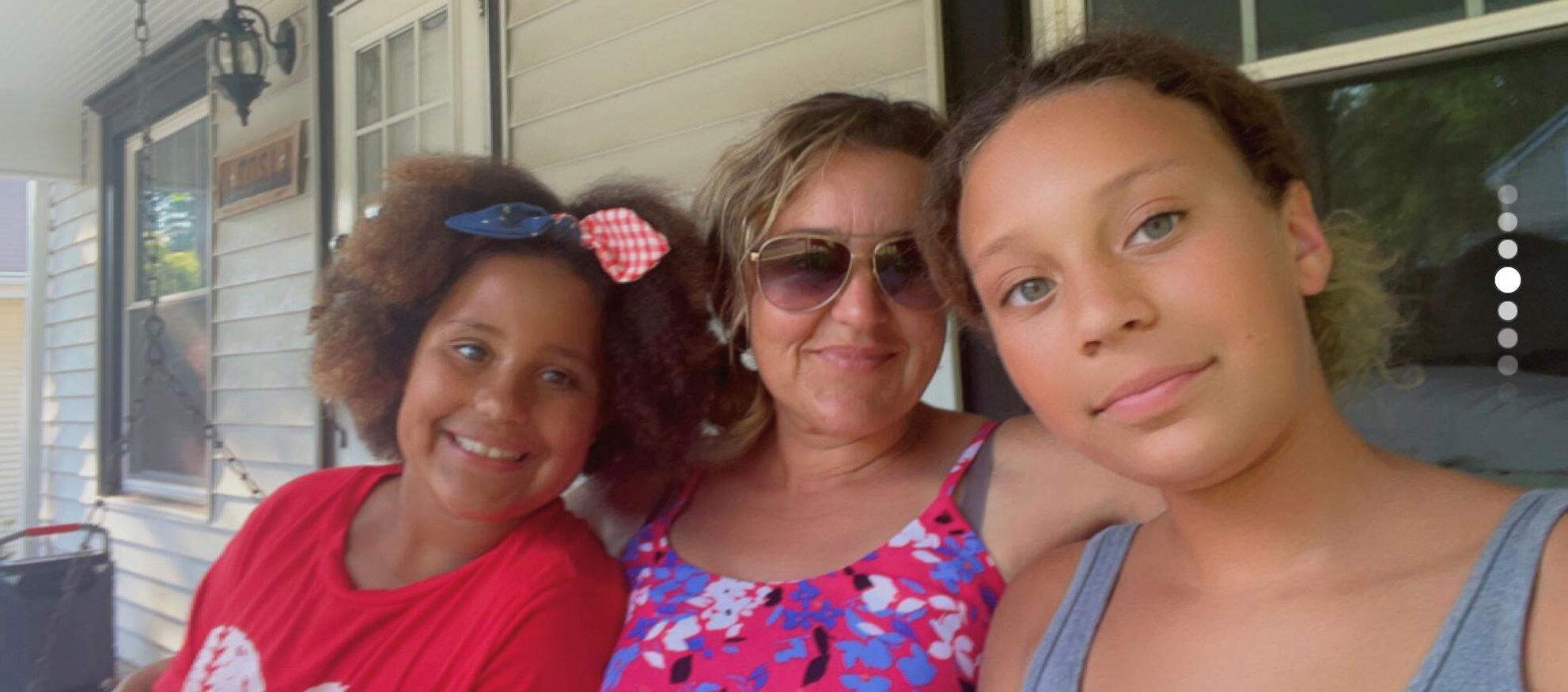
This fall and spring, Christi will have earned two associate degrees at Santa Rosa Junior College: the first one for a concentration in business and behavioral and social sciences; the second for psychology and administration. Her goal, she says, is to work in a business environment, in human resources, payroll or accounting.
Christi heard about Excell Network through Santa Rosa Junior College’s Second Chance Club; a program designed to support formerly incarcerated students as they pursue their educational goals. She enjoys getting together with the Excell Network students at the monthly meetings and hearing their stories.
“It’s really inspiring to me,” she says. “All of us have a connection. You can see it.”
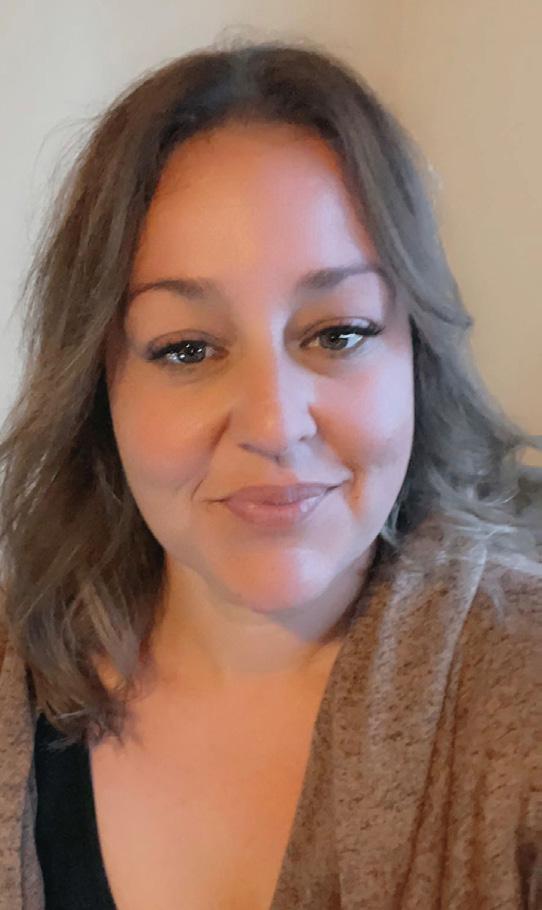
38 | Restorative Justice and Practices - Year In Review 2022
Students’ Retreat
On a sunny Saturday morning in late June, a dozen Excell Network students gather in the Mercy Center’s Cypress Room in Burlingame. They have come to the Sisters of Mercy’s well-known retreat center to step out of their very busy lives and reconnect with themselves, each other and God.
While those who have attended previous retreats have some idea of what to expect, others do not.
“I’ve never been to a retreat like this,” says Jacky Brown. “My retreat used to be standing on the street corner drinking and doing drugs.”
Like his fellow students, Jacky spent time in prison. Also like them, he left the path that took him there and embarked on one that leads to transformation and achievement. Although he has been up all night working at one of his two jobs to support himself while attending San Francisco State University, he wanted to be here because he likes to be around people “who have their heads on straight.”
“It feels positive,” says Rodney Thompson, who was recently released from prison after serving a 27-year sentence. “These are people doing things in their lives that I want to do.”
What the students are doing -- which is revealed during the introduction phase
of the retreat turns out to be a lot. Like Jacky, they all work and go to school. Some have families to care for as well. The retreat, says Excell Network founder and retreat leader Julio Escobar, offers them a much-needed respite from their demanding lives.

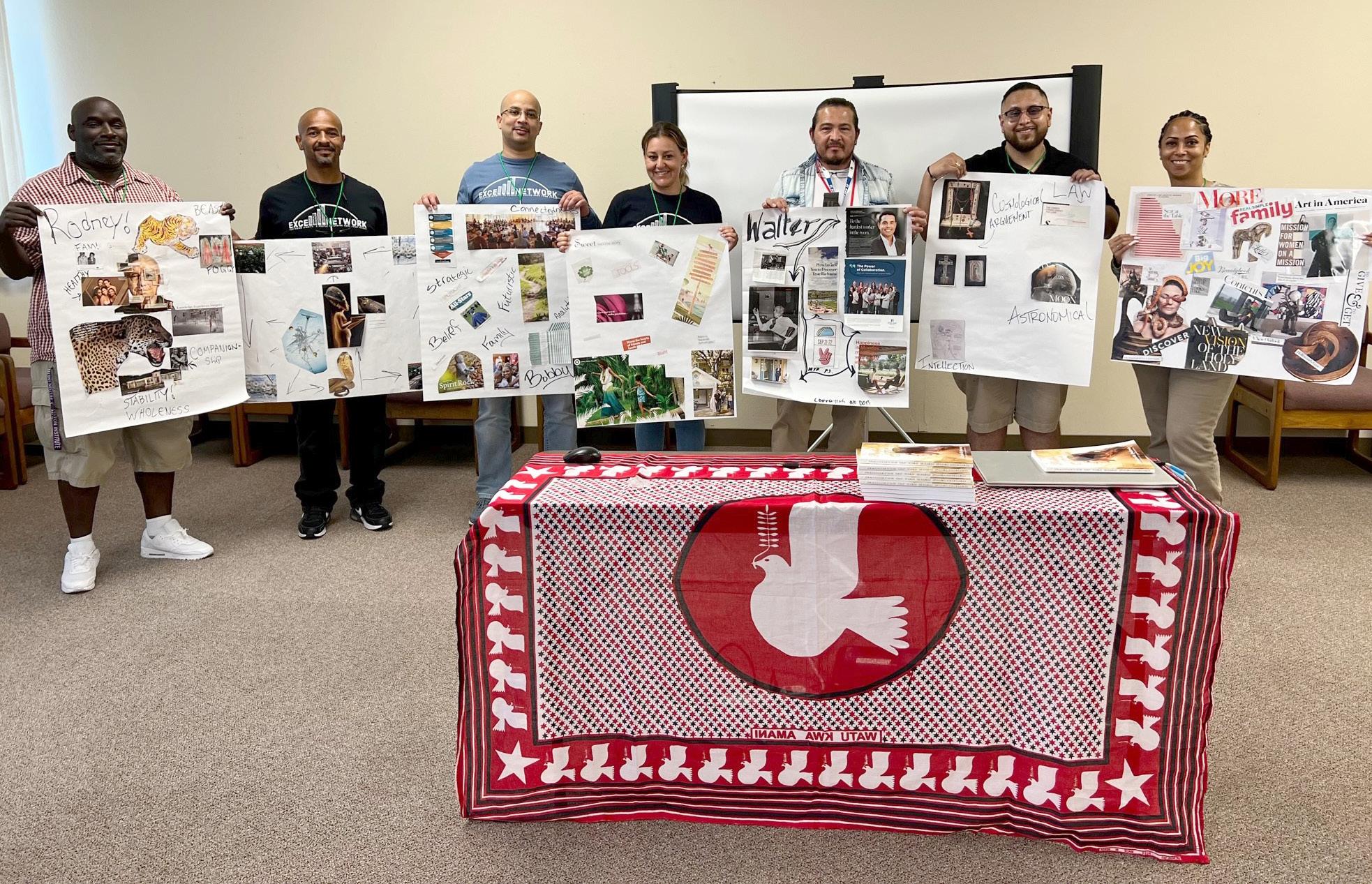
Sitting in chairs formed into a circle, each, in turn, talks about what a retreat means to them.
“I’m kind of a work-a-holic,” says Bobby Jones-Hanley. “For me, it’s a chance to get away from the rat race and disconnect from the craziness and get recharged.”
“It’s a time when like minds come together for rejuvenation, spiritual and emotional nourishment,” says Nicole Bronson.
For Joseph Krauter, a creative writing student at San Francisco State University, it is a “voluntary deviation from what you’re doing, a time to slow down and catch your breath.”
Adrian Lewis calls it a time “to find that energy to be the new Adrian, rather than that old person I was.”
For Walter Hidalgo, it is “a time and place where you can share and be yourself.”
Julio asks everyone to close their eyes and assume a posture of reverence.
By DEACON DANA PERRIGAN Writer | Book Author
A student rings the meditation gong. The sound of the gong slowly fades into silence. Several minutes later, Julio moves from one student to another, placing his hand on their shoulder and giving each a verbal assurance rooted in Scripture.
“You say: ‘I’m too tired.’ God says: ‘I will give you rest.’”
“You say: ‘Nobody loves me.’ God says: ‘I love you.’”
“You say: ‘I can’t forgive myself.’ God says: ‘I forgive you.’”
Later, Julio passes out a bracelet to each student that contains a passage from Scripture.
“We need to be reminded that God is with us,” he says, “that what we do we do not do on our own, but that we do it all with God.”
Julio then asks the students to comment on what they experienced during the meditation.
first published in Excell Network Magazine, Fall 2022 Issue Photos courtesy of Restorative Justice Ministry Restorative Justice and Practices - Year In Review 2022 | 39
Story
“I have to remind myself that I am blessed and that I have everything I need,” says Jessy Martinez. “If I can just wake up each morning and try to do what God wants me to do.”
“Yes,” says Nicole, “if we just try he’s not asking us to be perfect.”
“It was a time of calmness, of letting go,” says Rodney. “I’m used to doing things my way, but I don’t want to learn my lessons the hard way anymore.”
“A lot of the time we want to guide our own life,” says Adrian, “instead of asking for that guidance what is the will of the Father?”
“Once I forget myself, I feel a whole lot better,” says Miguel Infante, who underwent several rounds of chemotherapy and surgery in his battle against cancer and was recently awarded a scholarship to the University of San Francisco.
“I know I can’t do it myself, and that I have to do it with God,” says Elizabeth Quiroz, who brought copies of her recently published book, “Purified in the Flames,” to the retreat.

“Times like this are necessary so I can sit still in the moment, be intentional and step out of the wind,” says John Cunningham.
“I felt the calmness and the serenity which is great, because with me it’s
all go-go-go,” says Christi Grove. “It helps me to be open-minded and teachable all through the day.”
In the next phase of the retreat, Julio asks the students to talk about “Living Your Strengths,” a book designed to help people identify their strengths and to put them into action in their lives.
Following the discussion, they are asked to identify their mission in life.
“It’s to help change the perception of the black male,” says Jacky, “because I helped tarnish that image.”
“It’s to be a good steward,” says Rodney, “to be who I say I am.”
“To repair some of the damage I’ve done,” says Adrian.
“To support people who are going through a hard time,” says Jessy.
“To become a lawyer and work with the disenfranchised,” says Miguel.
“To obtain my certificate for accounting,” says Walter.
“To use my pain for a good purpose,” says Elizabeth.
“To be a light and a foundation,” says Nicole.
“To create opportunity for redemption,” says Bobby. “To help people excel.”
While two students say they don’t yet know what their mission in life is, just about everyone says that they feel their purpose in life, whatever it is, revolves around helping others.
After lunch, the students are given their final assignment: to create a collage using words, photos and illustrations clipped from an assortment of magazines that represents something about their life, mission or goals. When they are done, each student then gives a brief presentation of their collage to the group.
Elizabeth’s collage contains a photo of a storm.
“Trials can transform you,” she says. “And everything we’ve been through is turning ashes into beauty.”
Rodney’s collage contains a photo of a cheetah and a tiger.
“When I was on the street, I thought of myself as a beast, a predator.” A photo of a house, he says, “represents stability I want to settle down and have a foundation.”
Walter’s collage represents his goals to graduate, get a job, to establish community and a happy home.
Jacky’s collage contains a photo of an auto assembly line.
“It’s about rebuilding my life and being a role model,” he says.
Miguel draws the attention of the group to a photo of a cross.
“I was an atheist for 12 years,” he tells them. “Now, my faith is my foundation.”
At the end of the retreat, Julio asks the students what they take away from their day at the Mercy Center.
They tell him: Peace and serenity. Strength. Inspiration. Motivation. Community. Contentment. The desire to serve others.
“I love coming here,” says Miguel. “Every time I come here I feel better.”
40 | Restorative Justice and Practices - Year In Review 2022
ELIZABETH QUIROZ Excell Network Student
Adrian Lewis grew up in a part of America where the average child — according to twin studies by the Lancet and Rand corporations — has greater levels of post-traumatic stress than children in war-torn Baghdad, Iraq.
Known for its poverty, crime rate, gangs, and deadly riots, South Central, L.A., has been depicted in a number of movies, including “Boyz in the Hood.” The film, says Adrian, doesn’t come close to describing the gritty reality he remembers.
“It was pretty dangerous,” he says. “It was a hostile environment to grow up in.”










Adrian remembers being chased and assaulted on his way to and from junior high school. He remembers the day he was shot in the back while walking home from the swimming pool with friends. And he remembers being braced by gang members trying to determine if he was friend or foe.
“I told them I didn’t belong to no gang,” he says. “I thought that would be good enough. But it was implicit: If you grew up in a particular neighborhood in L.A., you were identified as a member of that gang.”

Raised by a single mother, Adrian never knew his father. And when his mother died of cancer at the age of 39, his world fell apart. A month later, at the age of 16, he was homeless and desperately searching for direction.


ADRIAN LEWIS
EXCELL NETWORK STUDENT





















































“Looking back,” he says, “it was a critical time in my life. I did need a positive role model. Not having that guidance, I was figuring things out on my own.”

















Impressed by the confidence and financial resources of gang members he met in his neighborhood; Adrian says he became infatuated with what the gang had to offer.
By DEACON DANA PERRIGAN Writer | Book Author Story






And once he was in — he was all in.


















































“I was one hundred percent committed to the gang,” he says. “I was willing to die for it. I was willing to kill for it.”
Three years later, he did exactly that. For the retaliation slaying of a rival gang member, he received a 19 years-to-life sentence and was sent to the California Correctional Institution — a supermax prison in Southern California — where he continued to take part in gang life, participating in gang riots and assaults.
“I wore my sentence like a badge of honor,” he says. “Coming as I did from dire straits; prison was a cakewalk.”












































































































































































































































































































































































































































































































































in Excell
Issue
first published
Network Magazine, Fall 2022
Photos courtesy of Adrian Lewis
Restorative Justice and Practices - Year In Review 2022 | 41
“I was one hundred percent committed to the gang. I was willing to die for it. I was willing to kill for it”
In 2001, three things happened that changed the course of Adrian’s life. He read L. Ron Hubbard’s book, “Dianetics,” which helped him understand how he had been reacting to the trauma in his life. On 9/11, he saw the horrific destruction of the Twin Towers by terrorists on TV. The outpouring of pain and compassion people were showing each other, he says, penetrated the shell of anger he had been living behind for so long. Later, he watched the TV news report about the fatal shooting of someone he had grown up with.
“I was sitting in the box with no one to talk to,” says Adrian, “and I needed to talk to someone. And so, I turned inward.”































































































































































































































































































































































































































































































































Alone in solitary, Adrian made three vows: He would never lie again; he would








never cheat; he would never steal. He also wrote down the values he would live by — gratitude, forgiveness, humility, health, and service to others.
Once released from solitary, Adrian began separating himself from gang life by dedicating himself to work in prison. When the opportunity arose, he enrolled in correspondence courses and completed programs in such things as anger management, substance abuse, youth mentoring, communication and dog training.




He also started playing handball.




















































































































































































































“Once I walked away from the gang, handball became my refuge,” he says. “I was a man on an island by myself, experiencing fear, loneliness and insecurity, so I went to the handball court.”
On Nov. 22, 2021, after 27 years behind bars, Adrian was released from prison. Now living in transitional housing on Treasure Island, he leads a busy life. He works as an ambassador for Five Keys, and as co-director of Farming Hope’s Garden in San Francisco. He recently completed a class at San Francisco State University and is studying community relationship management at Calbright College. He also trains dogs.
“Ultimately, I would like to do something to help others — especially those who are impacted by gangs. Maybe as a social worker or counselor.”






























































Adrian says the Excell Network program has been a great source of support and offers him a place where he can “let down my hair and be myself, be vulnerable . . . an opportunity to share my story and help somebody else.



“Some people tell me I’ve got it all together — but not necessarily. I’m still fresh out. I still have some issues, but I prepared myself. A lot of the things I’m facing out here, I prepared for. It’s not going to be easy, but I’m willing to go through the process.”


42 | Restorative Justice and Practices - Year In Review 2022
Volunteers serve Thanksgiving meals and hope in the San Francisco jails
On a Wednesday morning a week before Thanksgiving, Janet Shi huddles with about a dozen other volunteers in front of San Francisco County Jail #2 at Bryant and Seventh streets. In just a few minutes, she — along with the others — will be led through electronically locked doors, up an elevator, along the corridors and into the pods where 250 inmates live.
Earlier that morning, the diminutive woman had left her San Mateo home to be part of what has become an annual undertaking — bringing a Thanksgiving meal to all the inmates in the city’s two jails who won’t be sitting around a table with their loved ones this year.


“I was excited on the drive here ,” says Shi.


She was also, she later admitted, a little scared. Having never been inside a jail, her idea of what it might be like was largely based on images from prison movies — hard, dangerous-looking men yelling from behind the bars of their cells. A parishioner at St. Mark’s in Belmont and St. Gregory’s in San Mateo, Shi had considered volunteering at a previous Thanksgiving, but didn’t follow through.
This time, she made it.












Julio Escobar, the Archdiocese of San Francisco’s Restorative Justice Ministry coordinator, gives some last-minute instructions to the volunteers: After serving the meals to the inmates, they are to say a Thanksgiving
 By DEACON DANA PERRIGAN Writer | Book Author
By DEACON DANA PERRIGAN Writer | Book Author
 Restorative Justice Ministry
Restorative Justice Ministry











prayer. Following the prayer, they are then to ask the inmates what they are grateful for.
“We want to live the holidays with the people in here,” says Escobar, who coordinated the event. “We want to let them know that we are with them in their incarceration, and we do it by sharing Thanksgiving with them.”
Sharing Thanksgiving with the inmates, says Escobar, started five years ago. Initially, only a few pods of inmates received a meal. Later, as funding increased, more inmates were served. This year’s event, which cost $11,500 to serve 850 inmates, marked the first time since the COVID pandemic that outside volunteers could be used.
Following a prayer by Marist Father Rene Iturbe, the group breaks up into teams. Joined by several staff members, each team grabs a metal cart on which heat-retaining bags containing the individually packaged meals have been placed. Each inmate will receive a catered Thanksgiving dinner of roast turkey, stuffing, mashed potatoes, gravy, green beans, cranberry sauce, a dinner roll with butter and, for desert, a cookie.
Photos courtesy of
“It’s great to have the volunteers. It’s so impactful for people to know that they haven’t been forgotten.”
Restorative Justice and Practices - Year In Review 2022 | 43
Led by Alissa (Ali) Riker, director of programs with the San Francisco Sheriff’s Office, Shi and several other volunteers enter the pod where inmates experiencing medical and psychological issues are housed. Here, the inmates will not be allowed out in the common area to have dinner together. Instead, the meals will be passed through a slot in each cell door.
“It’s great to have the volunteers,” says Riker. “It’s so impactful for people to know that they haven’t been forgotten.”
Working together, volunteers pull the cart through the pod, stopping at each cell to hand out a meal. Riker informs the orange-clad inmates that the Thanksgiving dinner was funded, in equal parts, by the Archdiocese of San Francisco, Five Keys Charter School and the San Francisco’s Sheriff’s Office. Riker, or occasionally a volunteer, then asks each inmate to name something for which they are grateful.
“For my life,” says a shirtless young man whose upper torso is covered with tattoos.
“For you guys,” another inmate says, clutching his meal.
“For my family,” says another.
Standing behind the doors of their cells to receive their meals, the inmates seem curious, friendly and grateful. At one cell,
which houses two young women, one is not feeling well enough to get out of her bunk. Still, she manages a smile for the volunteers.
“I was a little hesitant at first to ask them what they were grateful for,” says Theresa Morse, a volunteer from St. Patrick’s parish in Larkspur who went into a different pod. “But they were so receptive. With very few exceptions, they had something to be thankful for. And they were grateful to us.”
Both Morse and Shi say they would gladly do it again.
“Absolutely,” says Morse.
“It was so rewarding,” says Shi.
The following morning, a similar scene — only on a larger scale –takes place at San Francisco’s County Jail #3. On this day, volunteers and staff gather to serve Thanksgiving dinner to the approximately 600 inmates inside the complex at Moreland Drive in San Bruno.
Donning masks and gloves, they form a large circle in the lobby of the jail. Yolanda Robinson, religious services coordinator with the San Francisco’s Sheriff’s Department, welcomes the group.


“I don’t have enough tongues to thank you for all you’re doing here today,” she says.

44 | Restorative Justice and Practices - Year In Review 2022
Next, Chief Deputy Sheriff Kevin T. Fisher-Paulson gives it a try. He tells the volunteers that their service today is a measure of their empathy and humanity.
“Remember,” he says, “every single person in here is loved by someone, and there is an empty chair at their family table this year.”
Following a prayer led by Father John Jimenez, the volunteers break into teams and stand by their carts. As on the previous day, they make their way through electronically locked doors, down corridors and into pods. Bhavani Kludt, a group facilitator with Community Works, which contracts with the Sheriff’s Department to bring programs into San Francisco’s jails, takes her group into 5A.
“Whenever anything special happens — it’s wonderful,” says Kludt. “It’s great fun to do fun stuff with the guys.”
Inside, two rows of cells line one side of the pod. On the opposite side of the pod, a deputy keeps watch from a raised observation post. On the floor between, there is a common area with tables where inmates can sit and play board games when they are let out of their cells.
Because there is only one deputy to supervise this pod and the adjoining 5B, Kludt’s group joins another group to first serve meals in the other pod. Later, they will return to their assigned pod.
The inmates — most of whom are Black or Latino and young — seem to welcome the disruption to their daily routine. Some wave and smile to the volunteers.
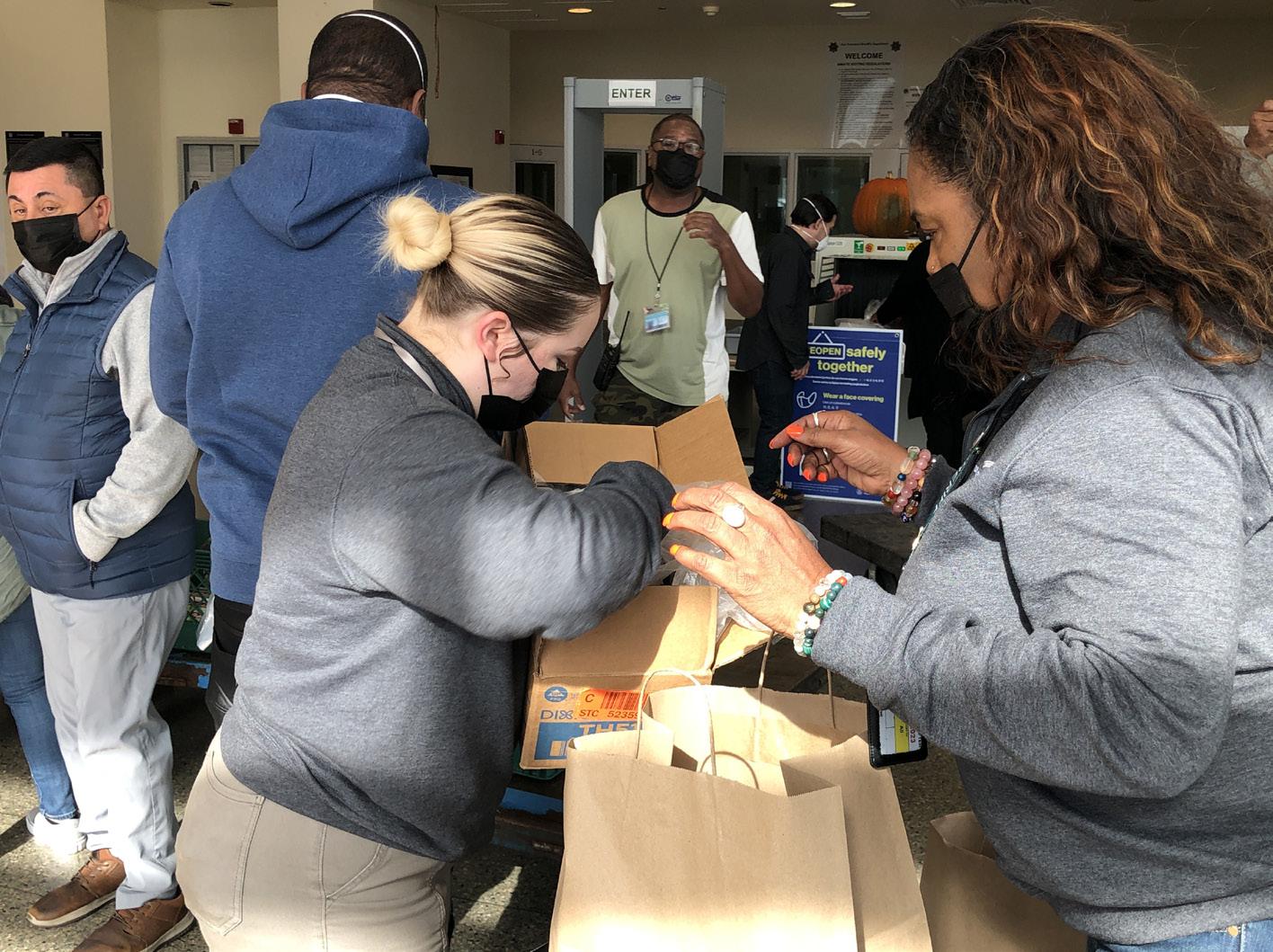
“Thanks,” says a young man after receiving his meal. “God bless you.”
Another, when asked for what he is grateful, says, “I’m still alive.”
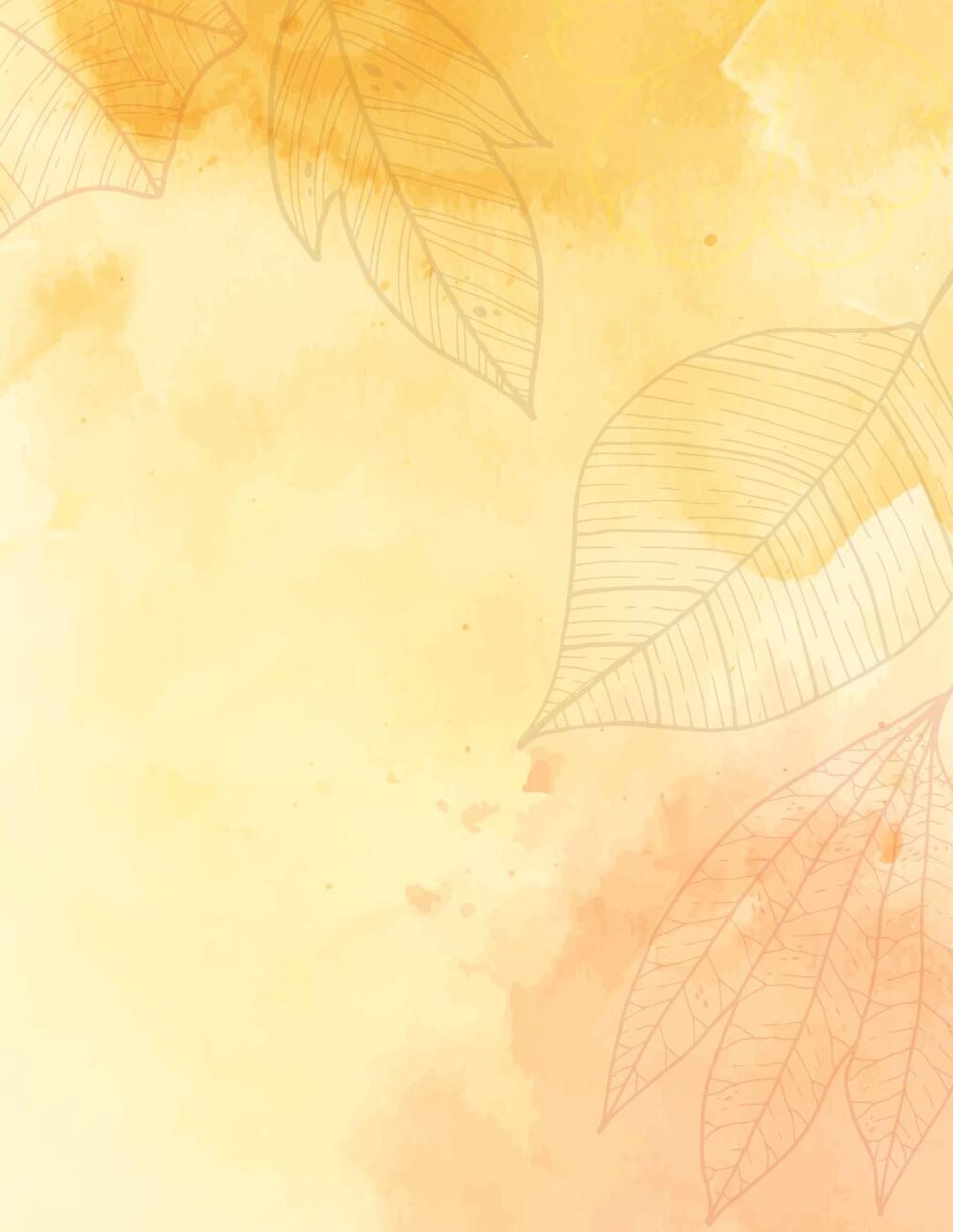
Two Latino men in one cell tell a volunteer in Spanish that they are from Guatemala, and far from the families they miss so much. Religious pictures adorn one wall of the cell.
Later, after the meals have been distributed and eaten, volunteers go from cell to cell collecting the plastic spoons and containers.
“I thought it went really well,” says Kludt, who took part in last year’s Thanksgiving dinner. “Every year, we always do a gratitude exercise with the guys — it’s good for them.”
Before the volunteers leave the pod, an inmate who was in court that morning returns to his cell. There are no meals left, but two volunteers leave the pod to find one. Returning several minutes later, one of the volunteers gives the inmate his meal.

“You probably don’t recognize me,” says the inmate, “but I remember you from juvenile hall. You used to volunteer there.” The inmate then tells the volunteer that he has been sentenced to federal prison.
It seems, for both, a bittersweet reunion.
Restorative Justice and Practices - Year In Review 2022 | 45


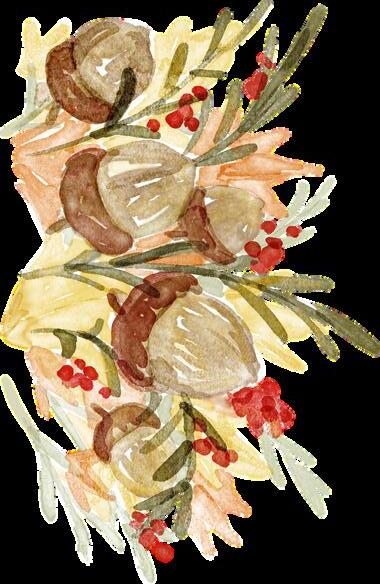






Bring the joy to a thankful heart! S H A R E A T H A N K S G I V I N G M E A L W I T H A N I N C A R C E R A T E D P E R S O N Luke 17:11-19 T H A N K S G I V I N G M E A L S W I L L B E S E R V E D T O 8 0 0 I N C A R C E R A T E D P E O P L E A T S A N F R A N C I S C O C O U N T Y J A I L S D O N A T E O N L I N E O R S E N D D O N A T I O N S P A Y A B L E T O ARCHDIOCESE OF SAN FRANCISCO ATTENTION: RESTORATIVE JUSTICE MINISTRY 1 PETER YORKE WAY, SAN FRANCISCO, CALIFORNIA 94109 DONATE ONLINE AT SFARCH.ORG/THANKSGIVING-MEALS I F Y O U H A V E A N Y Q U E S T I O N S C O N T A C T J U L I O E S C O B A R A T E S C O B A R J @ S F A R C H . O R G O R C A L L ( 4 1 5 ) 6 1 4 - 5 5 7 2 M E A L S W I L L B E S E R V E D N O V E M B E R 1 4 T H R O U G H 1 6 , 2 0 2 3 J O I N O U R P A R T N E R S D O N A T E A S A P A R T N E R “ W I L L Y O U M A K E A S M A L L $ 5 . 0 0 G I F T T O D A Y ? ” A $15.00 DOLLAR DONATION WILL SPONSOR A FULL MEAL 46 | Restorative Justice and Practices - Year In Review 2022
A Christmas party to remember for parents and children alike


Three days before Christmas, more than 150 children were given a wonderful gift: a whimsical, festive party where they could visit with Santa, dance to Christmas music, play with friends, and – of course – receive gifts. For many it was their first in-person party in three years. Their delight lit up the room.
“Our goal is to bring the love of Jesus to the children, to make Christmas a true celebration of love with tangible gifts to each of the little ones, the teens and their parents,” said Julio Escobar, coordinator of the Archdiocese of San Francisco’s Restorative Justice Ministry.


The party took place in the large hall of the event center at St. Mary’s Cathedral in San Francisco. Huge holiday inflatable decorations, including a blow-up Nativity, and dancing snowflake lights
on the ceiling set a playful mood as the children and their families arrived. For three hours, the children and their families were able to set aside their ordinary routines to celebrate Christmas and have fun.
Anyone would have had a wonderful time here, but it was especially joyous for these children, most of whose families had been touched by violence in some way, including in some cases the loss of a parent.
“Many parishes throughout the Archdiocese gave monetary support along with time and talent donated by a host of individuals. Eventually, dozens of other volunteers and several organizations and individual donors joined to make the event a reality, providing gifts, lunch, decorations, photos, and many hours of time,” said Escobar. “I am overwhelmed with joy by the generosity of so many.”
Story by JAN POTTS, Communications Consultant Photos by EDUARDO BANOS; Restorative Justice Ministry Volunteers
Restorative Justice and Practices - Year In Review 2022 | 47
Escobar conceived and organized the Christmas Angels party project.




Archbishop Salvatore J. Cordileone set aside a grant from his Archbishop’s Circle for the event, which was supported by the Global Children Foundation, 100 toys donated from the Family Giving Tree through Comunidad San Dimas, and individual donations.


The common thread for the majority of attendees was parents who attend parenting classes led by Sonia Batres, a domestic violence and immigration services coordinator at a local nonprofit, and by Escobar. The classes were in person for 28 years until
the pandemic forced them onto Zoom in 2020.
As families gathered at noon on Dec. 22, 2022, children began to approach Santa’s chair right away. The children were not reticent but ran right up to Santa to say hello, ask a few questions, and tell him what they were wishing for. Aside from the usual requests for dolls and skateboards, Santa was surprised by the wish of one older boy to attend Stanford; Santa extracted a promise that the boy would work hard at school to do his part to make that happen. Each family was given a professional photo of the visit with Santa to take home.

48 | Restorative Justice and Practices - Year In Review 2022
Children of all ages were also lined up at the face painting table, where they could choose from a variety of holiday images and colorful paints. After Santa, face painting, a pizza lunch and dancing with friends in the center of the large space, it was time for the raffle. Five desktop computers with

external monitors, three laptop computers, and one Nintendo Switch were raffled off to adults who accompanied the children.


One of the winners of a laptop was very happy that the family would not have to share their single computer for homework or other online tasks. She had
not expected to receive a gift herself, let alone a computer. She, like other parents, expressed gratitude for the event. One mother remarked that some of the youngest children are “COVID babies,” so young that they wouldn’t remember such events from before the pandemic. The opportunity to get together in person and the abundant space for children to play together were highlights for many.
After the raffle, the party came to a close with distribution of gifts to the children. When registering for the event, the person responsible for each child had selected a specific gift from a list of age-appropriate items, ranging from infant toys to wireless speakers. Some children returned to thank Santa and get one more photo with him and their present. As families left there were hugs and wishes for a happy Christmas and New Year, and many thanks for a wonderful party.
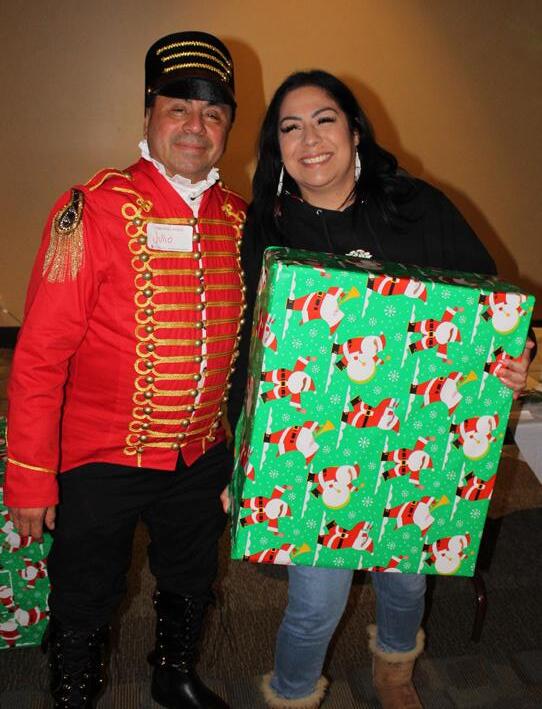
Reflecting on the event, Batres said, “You never know what the children will remember.” Years from now, many will remember the feeling they had this day, after so many years without parties. They will remember the excitement and fun they had, the volunteers dressed up as elves and a Nutcracker, Santa’s reassurances, and the Christmas Spirit that filled the room. Everyone involved hopes to be back again next year.

The Archdiocesan Restorative Justice Ministry advocates for peace and justice and provides support to people affected by crime – victims and offenders – within our communities for healing through prayer, prevention, intervention, and guidance. For more information: sfarch. org/rjministry.

Restorative Justice and Practices - Year In Review 2022 | 49
Restorative
Justice Ministry as Angels e of Human Life and Dignity





THIS PROGRAM IS SPECIFICALLY TO SUPPORT: CHILDREN IMPACTED BY HOMICIDE, CHILDREN WITH A PARENT IN PRISON, CHILDREN IMPACTED BY DOMESTIC VIOLENCE AND ABUSE




D E C E M B E R 2 1 , 2 0 2 3 | 1 2 : 0 0 P . M . - 4 : 0 0 P . M . S T . M A R Y O F T H E A S S U M P T I O N E V E N T C E N T E R - F R A N C I S H A L L 1 1 1 1 G O U G H S T - S F , C A 9 4 1 0 9 A D M I S S I O N I S C O M P L E T E L Y F R E E F O R R E G I S T E R E D F A M I L I E S ! P H O T O W I T H S A N T A , C H R I S T M A S G I F T S , F A C E P A I N T I N G , F O O D A N D D R I N K S CAREGIVERS, REGISTRATION IS OPEN FROM SEPTEMBER 15 - NOVEMBER 15, 2023 T O R E G I S T E R O R T O D O N A T E V I S I T S F A R C H . O R G / C H R I S T M A S A N G E L S R E S T O R A T I V E J U S T I C E M I N I S T R Y C H R I S T M A S A N G E L S E V E N T
F O R M O R E I N F O R M A T I O N V I S I T S F A R C H . O R G / C H R I S T M A S A N G E L S O R C O N T A C T J U L I O E S C O B A R A T ( 4 1 5 ) 6 1 4 - 5 5 7 2 50 | Restorative Justice and Practices - Year In Review 2022
Restorative
Justice Ministry as Angels
Life and Dignity



THIS PROGRAM IS SPECIFICALLY TO SUPPORT: CHILDREN IMPACTED BY HOMICIDE, CHILDREN WITH A PARENT IN PRISON, CHILDREN IMPACTED BY DOMESTIC VIOLENCE AND ABUSE






H O S T A C H R I S T M A S A N G E L S G I F T C A R D T R E E R e g i s t e r y o u r n o n - p r o f i t , b u s i n e s s , s c h o o l o r c o n g r e g a t i o n f o r a R e s t o r a t i v e J u s t i c e C h r i s t m a s A n g e l s G i f t C a r d C o l l e c t i o n P L E A S E S U P P O R T O U R L O C A L F A M I L I E S ! C H R I S T M A S A N G E L S , D E C E M B E R 2 1 , 2 0 2 3
F O R M O R E I N F O R M A T I O N , T O D O N A T E O R T O V O L U N T E E R V I S I T S F A R C H . O R G / C H R I S T M A S A N G E L S O R C O N T A C T J U L I O E S C O B A R A T ( 4 1 5 ) 6 1 4 - 5 5 7 2 D O N A T E A N D W E ' L L S H O P F O R Y O U A D O P T A C H I L D A D O P T A F A M I L Y V O L U N T E E R ( R E G I S T E R O N L I N E ) Restorative Justice and Practices - Year In Review 2022 | 51



















 Story by MELISSA VLACH, April 2022
Story by MELISSA VLACH, April 2022
 Action and Digital Media Coordinator Office of
Action and Digital Media Coordinator Office of




 &
&




































































































 Photo courtesy of Miguel Infante
Photo courtesy of Miguel Infante








 Story by PETER MARLOW Executive Director of Communications And Media Relations
Photos By FRANCISCO VALDEZ Digital Media Specialist Office of Communication Archdiocese of San Francisco
Story by PETER MARLOW Executive Director of Communications And Media Relations
Photos By FRANCISCO VALDEZ Digital Media Specialist Office of Communication Archdiocese of San Francisco






























































































































































































































 By DEACON DANA PERRIGAN Writer | Book Author
By DEACON DANA PERRIGAN Writer | Book Author
 Restorative Justice Ministry
Restorative Justice Ministry





































